#fellow travelers psychosis
Explore tagged Tumblr posts
Text
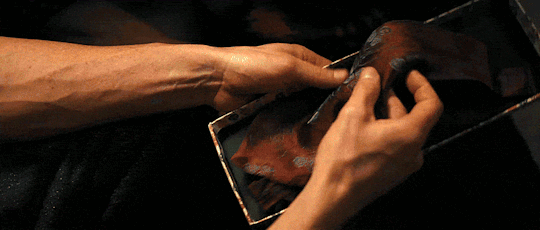
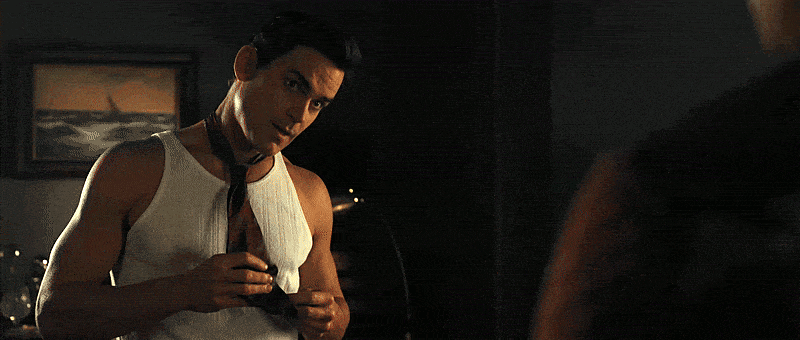






It hurts so much. But what they had in these moments was real. And, as Ron Nyswaner so beautifully put it, we're all in this together.
#fellow travelers#hawk's smile is the cutest thing i've seen in my LIFE#his arms#his veins#hawkins fuller#tim laughlin#hawk and skippy#the back rubbing really kills me#matt bomer#jonathan bailey#fellowtravelersedit#own gifs#fellow travelers psychosis
226 notes
·
View notes
Note
okay! i've been wondering how harry gets back in touch with his family after the whole amnesia thing and how they all handle that. and how was harry's relationship with them before that, also? is there a sibling he gets along with the best? do any of them also have weird brain things going on (like the psychosis, talking to things, heck even pale exposure)? if the sister who works at the harbor knows titus, how does the reveal that she's related to harry go?
i may have more but that's a lot to start with for now. i might come back another time :3
Alrighty! Gonna put this under a cut to save people from my old-ass being cringy lol
First, I wanna introduce the OCs I’ve made for Harry’s family! (Ages as of events of the game, March ‘51)
Alain Du Bois, father, dead (died in ‘21), born January 27, ‘80 of previous century. Was absent most of the time, abusive when around
Margarette Du Bois (nee Barrach), 70, born August 2, ‘81 of previous century. Kind, loving mother.
Victoire ‘Victor’ Du Bois, 48, born July 17, ‘02. A bit distant, also struggles with alcohol but not to Harry’s extent (he won’t drink while working), lorry driver, emotionally shut off, rarely smiles, known for his deadpan humour and really bad puns. Has whatever the lorry driver version of Esprit du Corps is. Married and has 2 kids: 21 year old son, 18 year old daughter. Pale exposure up the wazzoo due to having to travel through it. He knows the pale driver, and Tommy Le Homme.
Madeline ‘Maddy’ Petrovski (nee Du Bois), 46, born June 1, ‘04. Very friendly like their mum, short and chubby, cosmetologist (works for the biggest theatre company in Revachol - which still doesn’t pay that well - definitely working class), has some of the same psychological things going on as Harry (the lists - she does the lists as well). Married and has 4 kids: 16 year old daughter, twin 13 year old sons, and an 8 year old daughter. Her husband has addiction issues and isn’t the greatest but he’s kind and loving regardless - life isn’t always what we expect it to be.
Harrier ‘Harry’ Du Bois, 44, born January 3, ‘07. We know about him.
Mairi Du Bois, 42, born December 20, ‘07. The only one to really escape the poverty of their childhood. Geology professor in Sur la Clef. She has the same weird empathetic skills Harry has. Lesbian, married to a fellow academic, no children.
Eloise ‘Elsie’ McTavish (nee Du Bois), 37, born February 2, ‘14. A bit standoffish, she is a nurse, and recently divorced. Has plenty of similar strange psychological traits similar to Harry’s and is distressed over it, tries to ignore it. Has four children: Twin 6 year old son and daughter, 3 year old daughter, and a year old daughter. Currently lives with their mum due to financial stress as her ex-husband is a deadbeat and can’t be found (he’s a former friend of Harry’s and Harry vows to beat the shit out of him if he ever sees him again).
Marcelline ‘Marcy’ Du Bois, 34, born January 4, ‘17. Exactly the same psychological stuff as Harry. Divorced because she had a few miscarriages (her ex-husband is a piece of shit - upper middle class weenie). Very outgoing, works in Martinaise surprisingly as a shipping container inspector (enemies to lovers type thing with Titus Hardie eventually) (also didn’t know her brother was the absolute mess of a detective doing the investigation into the Hanged Man). Has some issues with making relationships for obvious reasons. No children. Her favourite sibling is Harry. She is Harry’s favourite sibling (he got a baby sister for his 10th birthday). Because of Marcie’s proximity to the hole in the universe she also has some issues with pale exposure.
My headcanon for Harry getting back in touch with his family post-amnesia is a little wishful thinking on my behalf, I suppose.
So, as we know Harry has blanked before after some epic benders - purposefully. I figure it would only be a matter of time before he gets his memories back.
In my postgame HC/AU/whatever you wanna call it I figure this happens roughly a month after the events in the game - and it happens fast and painfully - leaving Harry in a very very emotionally unstable place. Thankfully, Kim is there and Judit is also very understanding. Harry’s reaction to all of this suddenly happening is what gets Jean to finally believe Harry had amnesia. Throughout it all Harry still remains sober (this is again wishful thinking on my behalf due to my own history with alcoholism [grew up with it, know it’s damages]).
Shortly after this is when the Kim is Revachol comic takes place (so mid- to late April). Kim encourages Harry to reach out to his family after learning about them. Harry is understandably terrified as the last 6 years have been strained due to his spiralling into further alcoholism and drug abuse after Dora left him. After university I HC that Harry dived into the Disco/party scene heavily, especially after meeting Dora, so alcohol and drugs have been an issue of his for a while before Dora left. I think that after he became a cop these addictions got worse as he struggled to cope with the realities of what he had to do as a cop and what he had to see. I imagine things were a bit tense after Harry met Dora, as I HC the rest of his family not really liking her all that much due to class differences (and I imagine her family didn’t like him either for the same reasons). Harry’s family does their best to make Dora feel welcome though and they get along well enough until finally she leaves and he goes off the deep end. His older brother quietly stops talking to him, his older sister tries her hardest to help but he doesn’t accept it. Mairi is on another isola so there’s not much she can do. But she makes sure to call him once a week and this doesn’t stop until the events of the game. Eloise is very vocal about her displeasure with what he’s doing but still tries to support him in small ways. Marcelline is heartbroken but refuses to give up on her brother. They get drunk together a few times over the years post-Dora/pre-game. Harry refuses to be around his mum when he’s drunk or high, but she is well aware of how rough he’s living. He builds her a gazebo one summer when he tries to sober up (I like to imagine him being good at carpentry). He gets Jean to help him.
Because family is important they all open their arms to him when he reaches out. Because all of them have some extent of Harry’s weird abilities they can tell he means it this time when he says he’s trying to be better, be the Harry they knew before he met Dora, before he let his life spiral. Harry slowly integrates into his families’ lives. Harry made sure to never be high or drunk around his nieces and nephews so he’s always been the fun uncle, and now they get to see him much more often. Harry cries so much when his oldest nephew introduces Harry to his grand-niece. The family also openly embraces Kim, Cuno and Cunoesse. And Rene in my AU. Harry’s sisters are excited to have a new brother-in-law and niblings. Victor quietly respects Kim for being able to help Harry pull through this time. He also teaches Cunoesse how to work on a lorry engine.
When Titus learns that the chubby babe Marcy is Harry’s sister he’s not all that surprised. Once he knows he can see the familiarities there. After the events of the game, I HC that Titus slows down on the partying and sleeping with younger women (the man is 39 after all). He kind of becomes a bit more reserved, especially after losing his best friend and the others. Marcy was close with Angus so she understands Titus’s pain. They grow close. Harry gets a bit put-off when he learns that they start dating. Kim is highly amused by Harry’s protective older brother attitude.
I likely have more to add but I’m losing steam lol
#disco elysium#original characters#head canon#discocs#harry du bois#kim kitsuragi#cuno#cunoesse#harrykim#kimharry
31 notes
·
View notes
Text
One Song for Every OC Tag:
I was kindly tagged by @rickie-the-storyteller for this one! I had a pretty crazy week, so I was slow on responding to my prior tag games, but I am now trying to catch up!
Rules - Assign a song that fits the vibe of your OC
As someone that adores making OC playlists, this is going to be so fun to do! Anyways, let’s get started!
Raelen - Dance With Fire by Karliene
Azra - Dragon by Built By Titan
Julyan - Nothing Is Lost by Weeknd
Ansell - The Moon Will Sing by The Crane Wives
Ellinor - Castle by Halsey
Jamie - Dear Fellow Traveller - Sea Wolf
Zephyr - Streets of Gold by Aviators
Orion - Drown With Me by Falconshield
Myrah - Loreley by Blackmore’s Night
Nethen - Beautiful Crime by Tamer
Nyx - Song of The Seven by Joey Batey (from The Witcher soundtrack)
Bryn - Psychosis by Mitchel Dae
Nadinne - How Far I’ll Go - Moana
Kaden - Bard’s Songs by The Blind Guardian
Sybil - Savage Daughter by Sarah Hester
Cassander - Guns For Hire by Woodkid
Luciya - Over The Hills and Far Away by Hurdy Gurdy (cover)
Morwan - The Calling by The Amazing Devil
Vallerius - The Horror and The Wild by The Amazing Devil
Tanwin - Heart Of The Night - Divide Music
Darian - Lend Me Your Voice - Belle (Male Cover)
Yuna - Mary Read by Karliene
Fabian - Enemy by Imagine Dragons
Emryc - Everybody Loves Me by One Republic
Tagging (gently) - @lassiesandiego @writernopal @clairelsonao3 @liv-is @elshells @cherrybombfangirlwrites @unstablewifiaccess @jasperygrace @moonandris @repressed-and-depressed @lyutenw @gummybugg @sagewildflower
13 notes
·
View notes
Text
Well, well, well. It’s that time of year again in the Netherlands. Not just to celebrate the second Bitcoin Conference in Amsterdam, but also the arrival by steamboat of our red caped Saint, the Holy Man himself, patron of boats, sailors, and little children: Sinterklaas. Yes, he’s the bringer of gifts in the shoes of Dutch kids and swaps a carrot or drawing for a gold ribboned package of your deepest desire. He’s the original boss, Santa's precursor (too bad Murica), and my red pill incarnate. Back at primary school, when I still ‘believed’, it was Micky, a kid from class, who burst my magical bubble. He was a funny boy and used to play tricks on everybody. For instance, he’d ask you coke or sprite, and whatever your response, he’d twist your wrist so badly you’d experience the ‘fizz’. Playing marbles with him was also a bad idea as the rules would change (in his favor) whilst playing, subsequently losing all my pretty beads. Of course it was Micky who’d break the magic spell I was under. I must not have been the only one, for he probably red pilled the entire class, but that day I understood: Sinterklaas was a scam. And I came down from my psychosis in which a bearded old Catholic pushed free gifts through my chimney as he traveled our gabled roofs at night by horse. Frankly, I didn’t take it well. I felt dumb and disappointed by my parents. How could they lie to me? What had I done? I thought I was a nice boy? Anyhow, I didn’t tell them I wasn’t a believer in Sinterklaas anymore, as I didn’t want to shame them. Also, it was nice to be on the right side of the information asymmetry, so I shut up about it. Big mistake. That year my parents rented a Sinterklaas and helpers who came knocking at our front door. I had to let them in and play along. Too late to confess. Decades later I have to listen to my parents saying how wonderful it was that I still ‘believed’ that year. So embarrassing! Damn Saint.But how real He had been, how I had believed the nonsense, and how painful the final reveal. What a cheat! I should have trusted my gut feelings around the anomalies, so Micky wouldn’t have to embarrass me so badly. Sigh.Fortunately, I have made peace again with my Holy Man. In this demythologized world, I’m grateful the pagan tradition has survived and that every autumn the old bearded red fellow still rides the roofs and cobblestone streets, chucking candy at the youngsters. He’s a trickster god, a benevolent humbug, who explains his scheme and shows the secret, to teach you a valuable lesson for adulthood with its many fake constructs grownups blindly believe. Unfortunately, in adult land, there’s nobody to wake you up. And so we keep on dreaming. Yes, Sinterklaas was very nice indeed, wasn’t he? He’s the tutorial. A free introductory course into the mechanisms of belief, deceit, and psychosis that deceive the eyes. Make no mistake, for that's Sinterklaas' greatest gift. Vanishingly few!But most grownups have forgotten his teachings. So certain are they. Hear they nothing what he says? With coco futures soaring to all time highs, even the Sinterklaas’ chocolate coins have become a better store of value compared to the euro, pound, or dollar. And yet we keep on believing; patting ourselves on the back for not trusting in myth, fairytale, or Saint, whilst blindly confiding in the world’s greatest paper fantasy. But, you must feel the scam around you. Here, between you, me, the chocolate coin, the peso, everywhere. Yes...even between the land and the steamboat.Hence the Sinterklaas experience is not just a local tradition but a metaphor for the global initiation into Bitcoin. All fiat freaks are still children in that sense. But without a trickster guardian, who's going to teach them? How will they wake up? When will they realize it is spawned out of thin air? Painful it is to admit one has been fooled. But the most agonizing thing is to be orphaned from the system. Especially when you have never been rugged, this abandonment can be too much to handle, persuading people to remain asleep.
This is why I celebrate my Saint. And I feel sorrow for the ones who have forgotten, where he's been erased from existence. But my trickster survived. He rugged me early, so I could see the rug later. And find my way...to the real.So in October, do the man a pleasure when you’re flying over to Amsterdam. Whether you’re a fiat fanatic, alt bag holder, or got your burlap sack already filled to the rim with sats; go buy some chocolate frogs, a sweet Sinterklaas effigy, or some carrot-cake flavored peppernuts at the Albert Heijn supermarket. Export his chocolate coins all over the world and inflate your sweet fiat friends till the sugar decays the enamel of their pristine white teeth. Praise the Man. Honor the Saint, the patron of gifts, tricks, and rugpulls. He wants to return. I believe in him. And am grateful to have been an early initiate.
0 notes
Text
An analysis of Xiao’s mental state
Okay so I’ve finally finished gathering all the info to make a coherent post about this. It took a hot minute but it was so worth it. The new trailer is a gold mine and it confirms some things that I’ve been thinking about for awhile now. Given the time of year, I think it’s time I pointed out something that’s so obvious, yet I have never seen a discussion about.
And that is Xiao’s (and his fellow yakshas) experiences with psychosis, and what it could mean for 3.4.
⚠️ DISCLAIMER ⚠️
I am not claiming that Hoyoverse intended to write Xiao with a mental illness and I am not diagnosing him with a condition. Psychosis is a symptom, not a condition in and of itself, and it can be caused by many different things, not just mental illness. I am also not going to be exploring a cause, simply pointing out that Xiao’s experiences as they have been shown to us so far (as of the ‘Endless Suffering’ teaser trailer) are an accurate depiction of psychosis.
That all being said, please proceed with caution. This post talks about and contains examples of delusions, auditory and visual hallucinations, disordered thoughts, and other features of psychosis, as well as character death. If these are triggers for you, please be careful.
Also, obviously there are spoilers ahead.
Discussion begins beneath the cut.
According to the DSM-5, psychosis is “defined by the presence of delusions, hallucinations, formal thought disorder (ie, disorganized speech), or abnormal psychomotor behavior (grossly disorganized or catatonic behavior), not better explained by another mental disorder, substance use disorder, or medical condition.” I realize that probably means a whole lot of nothing to most people, but don’t worry. Let’s take it one piece at a time.
Here, delusions do not refer to the in-universe devices made by the Fatui. Delusions, as a feature of psychosis, are false beliefs about reality that a person cannot be dissuaded of, even when the belief is undeniably proven to be false.
Let me give you a real life example. Imagine you have a friend over for dinner and you notice they haven’t touched their drink (let’s say it’s soda). You ask them what’s wrong. They say they refuse to drink the soda because the manufacturer is putting poison in it. You tell them that can’t be true because it would be on the news if it was true. You tell them that you have never gotten sick from this soda. You even drink a cup of it in front of them and nothing happens. Still, they insist it is poisoned.
This is an example of a common delusion. However, delusions come in many different forms.
Now, Xiao doesn’t immediately appear to have any delusions, admittedly. Even if he didn’t, that wouldn’t mean he isn’t experiencing psychosis; of the four features, only one needs to be present. That being said, I do want to point out one potential delusion:
His belief that his presence (or more specifically, his power) harms mortals.
I want to be clear that I am not talking about his backstory here. Xiao harmed mortals while enslaved to a previous god and I am not saying that didn’t happen, or that it was a result of a mental illness (because it wasn’t). What I am saying is he seems to believe that just existing around people can and will harm them, when what we see in game says the opposite. And no, I’m not just referring to vision holders, but normal people as well.
He claims that adeptal energy harms mortals. We see this several times in game. He says it when we first meet him.
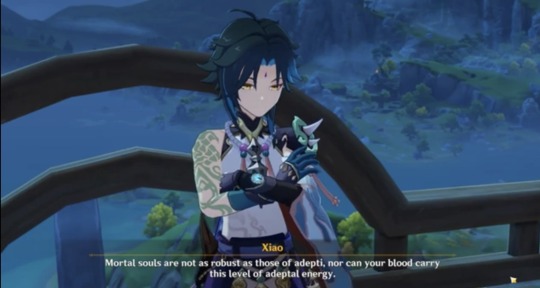
And still seems to believe so during Perilous trial. (Otherwise Paimon wouldn’t be comforting him over the thought.)

Yet, we as the traveler, nor any other character he has interacted with on or off screen (that we know of) has fallen ill. Now for vision holders (aka playable characters) that can be explained away. For whatever reason, visions seem to increase a mortal’s tolerance to this energy.
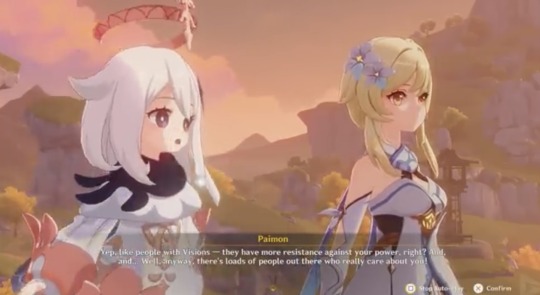
So sure, if we assume his power really is dangerous, then ours, xiangling’s, and the Perilous trial gang’s lack of sickness from being around him doesn’t disprove this belief. But you know what does?
This NPC.
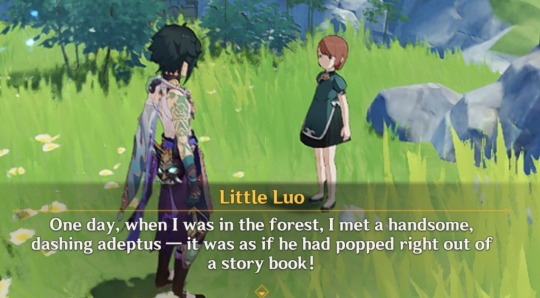

And all the visionless soldiers from the fight against Osial.
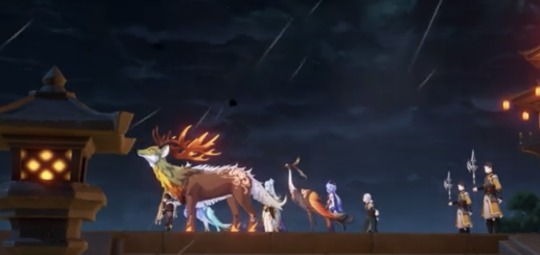
And everyone that passes Xiao in the harbor from the newest official video.
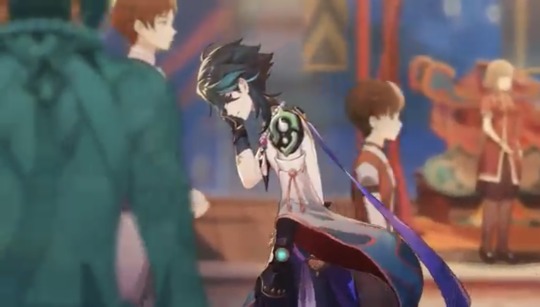
This isn’t even mentioning event content, like the time that we call for Xiao in the harbor to taste Xiangling’s cooking, or the in-game novels about the yakshas and adepti, which have only good things to say. You would think that one of those legends would tell of the horrors that follow the Vigilant Yaksha if such things were true.
But okay. Let’s say that none of these interactions were ‘long enough’ to cause the harm he believes will come to those around him. That still doesn’t explain why Yelan has a voice line about his presence aiding visionless mortals.
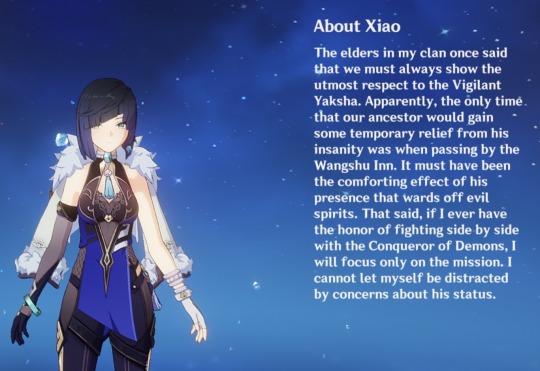
It doesn’t make sense that his presence could both have a comforting effect and a harmful one. And considering Yelan has an account of a person who had a (recurrent) positive experience from Xiao’s presence, and we have no accounts of a person who had a negative one, I’m inclined to believe Yelan. Yet, as far as we are made aware, he still believes enough contact, even with vision holders, will hurt them.
Remember, I’m talking about his power, his presence, not his karma.
See the parallel?
Let’s move on to the next feature.
Hallucinations are experiences of sensations that are not actually present. They can be heard, seen, felt, smelled, tasted, etc. Most people hallucinate from time to time, especially if they’re tired. Ever thought you heard someone call your name and they didn’t actually say anything? Pet owners, ever thought that you saw your pet walking in the corner of your eye, when they were sitting right next to you? Those are examples of hallucinations.
This feature is more obvious for Xiao. Starting with the most obvious, he experiences visual hallucinations, which were very clearly shown in the ‘Endless Suffering’ video.
Now before people brush this off as an artistic representation of his karma haunting him, may I remind you that there is literally a scene where the hallucination is shown through his eyes, and when he blinks it disappears, replaced by a little girl with a replica mask.
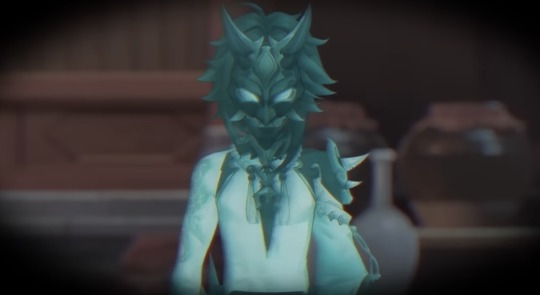
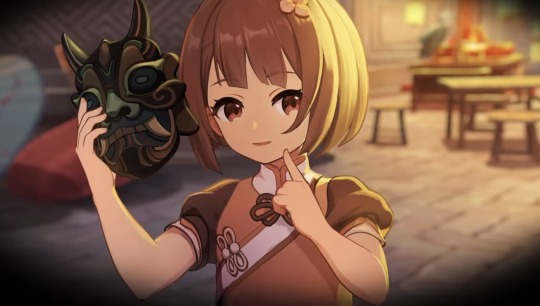
Notice how he sees the hallucination before looking to the little girl’s location. This shows that he was hallucinating beforehand, not mistaking what he saw for something else.
I believe the ‘other Xiao’ that he was shown to be fighting with earlier in the video to be something else. Due to the black aura coming off of him there, that seemed to be some sort of miasma or karmic manifestation. This makes sense, as he was fighting other monsters like hilichurls just beforehand. Regardless, the Xiao with the black aura and the greenish Xiao from the harbor were intentionally made distinct to show that they are not the same thing.
Similarly, he might also experience auditory hallucinations. I wasn’t able to catch something from the video that seemed to be this kind of hallucination, though Xiao does have a voice line about hearing voices.
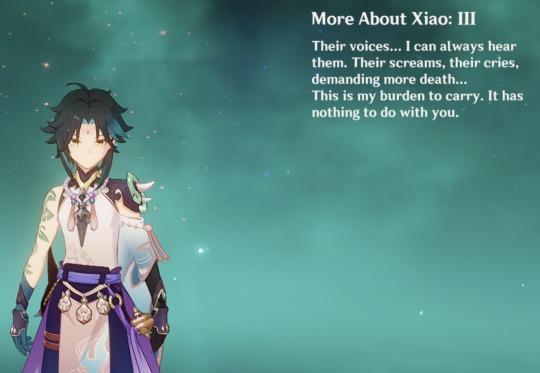
This one is less concrete, as this is a fantasy world and the voices he hears could very well be really there. He tells us that he also hears the wishes of all those that wish on the lanterns at lantern rite. It could be an adeptus thing. So feel free to believe this one or not, but I wanted to put it out there.
Next is formal thought disorder. This feature refers to impaired ability to sustain and express coherent thoughts. Xiao does not seem to struggle with this at all, so I won’t dwell on it. Again, he doesn’t need to experience this to be experiencing psychosis, since we already established he is experiencing other features.
Abnormal psychomotor behavior looks at outward responsiveness to the environment. Both behavior that is unusually active (combativeness, restlessness, emotional agitation) and unusually absent (unresponsiveness) are possible manifestations of this feature.
Xiao is said to experience unprovoked bouts of anger and fear in the book ‘Yakshas: The Guardian Adepti’ just as his fallen comrades did as well. This book outright confirms that the other Yaksha all experienced psychotic episodes prior to their deaths and is both a great source of evidence for this topic as well as just a great lore read. The cutscene of Bosacius’s last moments is also a great example of psychosis. But I digress.
I was surprised to find that Xiao’s voice lines indicate he is pretty restless. Hoyo doesn’t repeat information unless it is important, and Xiao has not one (1), not two (2), but three (3) voice lines about his dislike for standing around or being idle.
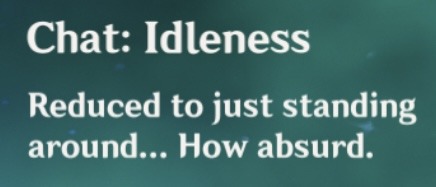
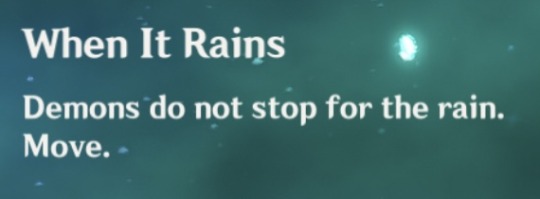

Seems pretty restless to me.
Returning to the video once again, we can infer from the little girl’s dialogue that Xiao is at times unresponsive. If you want to watch again for yourself, the dialogue is from 2:22-2:39.
If you don’t, the scene is of the girl speaking to Xiao, but he doesn’t respond to her comments about her mask, or her asking if he is okay. Even when the girl calls to her grandfather to give Xiao some rice wine pudding, his only reaction is to close his eyes.
This is very unlike Xiao. From the Perilous trial quest, we know that he does not become withdrawn like this when tired, so exhaustion from fighting wouldn’t explain his behavior. He has never been shown to act like this, even around strangers. If he didn’t want to interact, he would simply teleport away. Except Venti’s later comment of the rice wine on his breath implies that he stayed. Therefore, this also seems to be evidence of abnormal behavior.
Everything I have discussed so far are positive symptoms, which cover abnormal experiences of psychosis. There can also be negative symptoms, or reduced experiences, that occur at the same time. These can be inability to show emotion, apathy, or withdrawing from social experiences, among other things. Presence of these symptoms starts to lean towards a specific condition, namely schizophrenia, but since they are relevant to Xiao’s behavior, I still want to mention them.
While Xiao openly admits to not understanding or experiencing human emotions, this is clearly an adeptus thing. Other full-blooded adepti such as Cloud Retainer share this experience, so I won’t consider it here. And while Xiao says he can’t understand human emotions, he seems to be able to sympathize, or at the very least treat others’ emotions with respect.
On the other hand, for what otherwise seems like an improvement, Xiao’s want to rest instead of stay with Venti concerns me. Firstly, because he has been shown to deny the need or want for rest every time it comes up in recent events. Secondly, because their dialogue indicates that late nights drinking on the roof are somewhat commonplace for them. Thirdly, because he was actively experiencing other psychotic features directly prior to the interaction, and him turning down Venti’s offer could be him starting to withdraw socially.
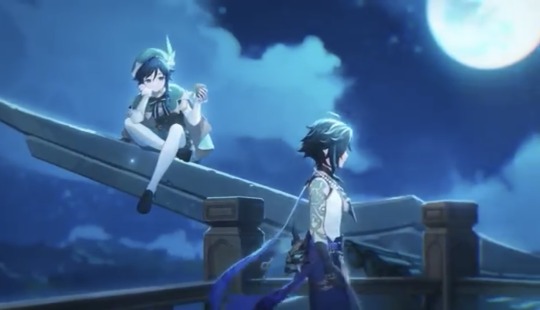
It should be noted that Xiao has already almost succumbed to his karma once, and the description of that event seems to suggest that he was deep into a psychotic episode at the time. This parallels the fates of his closest comrades, who all met their ends in this way. It is implied that his condition has since improved, though lantern rite is always a difficult time for him, and the trailer is letting us see for the first time what that really means.
Unfortunately, people who experience psychosis and psychotic disorders have poorer life expectancies than their peers. In game, psychosis has been shown to be a staple disorder of yaksha who are overwhelmed by their karma and will soon die. And right now is the time of year that it is all at its worst for the yaksha.
Death flags are waving for Xiao.
At the same time, his support system has grown larger than ever. Not only does he have Zhongli, but the traveler, Xiangling, Yelan, Yanfei, Itto, Shinobu, Qiqi, Baizhu, and Venti. Osial has been buried in the ocean once again and the earth rests. Burdens such as Bosacius’s unknown fate have been lifted off his shoulders, and he’s learned that maybe his siblings’ wishes for a mundane life aren’t out of reach after all.
With update 3.4 only a few days away, we’ll soon get to see what all this means for him going forward. Hoyoverse posted this video a few days before the update for a reason, and its contents show Xiao’s struggle in such a raw, new way for a reason. I can only assume we will see his current health addressed in some way, and while I will prepare for the worst, I will also hope for the best.
As an aside, I would like to take the time to applaud Hoyoverse for the effort they have put into making these depictions accurate. Psychosis is clearly an important topic when it comes to the yaksha and the effects of the bad karma they receive from their duty. I believe it is being used as a foreshadowing tool now, but despite being used for narrative, the disorder has been accurately and diversely represented amongst the yaksha (Bosacius’s cutscene vs Xiao’s teaser trailer), and most importantly, these characters remain fully fleshed-out people, not caricatures of mental illness.
Xiao is psychotic. He is also kind, loyal, and a strong warrior. He mentors others when they ask. He loves almond tofu and music. His dream is to dance among flowers, free from his duty as a yaksha. And despite Xiao’s past, of the violence he was forced to commit as a slave, and the danger that comes with battling alongside him, Hoyo makes a point to show that he has sworn to protect mortals and has never wished to harm anybody.
That is a distinction that is sorely underrepresented in media. Experiencers of psychosis are not inherently dangerous or violent, and of the two psychotic episodes they have depicted in detail, neither included violence toward people around the sufferer.
Once the second dropped, I couldn’t continue keeping this to myself, not when this gem of a detail has been going unnoticed by many. So once again, may I just say: well done, Hoyoverse. Well done.
Thanks for coming to my TedTalk. Happy Lantern Rite.
#tw psychosis#psychosis#tw delusion#tw mental illness#tw disordered thoughts#genshin xiao#genshin impact xiao#long post#genshin yakshas#genshin analysis#character analysis#character study#genshin 3.4#genshin spoilers#other content
46 notes
·
View notes
Text
Stoker (2013)

Nature versus Nurture proves to be a dark and twisting labyrinth. Following the sudden and unexpected death of Richard Stoker, mourning widow and daughter Evelyn and India find themselves suddenly joined by Richard’s long-absent brother Charlie. All those years traveling the world and back just in time for the funeral. If Evelyn finds herself swept up by his wiles, the introverted India remains wary. It’s clear that Charlie desires to insert himself into the lives of these women, but to what end? Even in the face of her resistance, Charlie makes clear the lengths he would go to for India, even beyond the pale of what is ethical and moral. He’s been fixated on India since her birth, viewing her as a kindred spirit whom he needs to set free. In time, the bigger question becomes whether or not India will succumb. In many ways, the film ascribes to this psychosis as a generational inevitability, but perhaps one put on by the family members themselves. Charlie is a killer, that much is undeniable. But when Richard grew up and married, he perhaps feared his child would be capable of the same evil. The hunting sessions at which India proved so adept were a sort of positive outlet for her, something to channel that latent psychosis rather than lashing out at her fellows. India comes to understand it as such, helped along in no small part by Charlie himself. Yet she also uses violence against her classmates, stabbing a boy with a pencil. That act was self-defense, but doesn’t explain her reaction to the killing of her defender turned assailant Whip. She touches herself in the shower after witnessing his murder, fear and trauma becoming ecstatic release, the first expression of sexuality from an otherwise closed-off character. Yet all of these are the machinations of Charlie, subtly pre-informed by her father. Killing may be India’s nature, but perhaps only because she believes it to be so.
A dreamlike hallucinatory film, formal elements of Stoker feed the uncertainty of this family trauma. Always flitting about on the piano, India finally opens herself fully in a duet with her uncle. Initially combative and uncertain, two musicians staking their respective claims to the keyboard, it becomes more rich and collaborative as the two strike an uneasy partnership. India builds towards a sort of musical orgasm, transported by this man she keeps glancing over at with unease. There is certainly something unnatural about Charlie, even before we learn his dark secret and the truth of his past. It all comes down to his eyes, unnatural icy blue irises glinting across the dinner table of up from a convertible. This choice leans into the uncanny valley as with Isabel Adjani and Sam Neill in Żuławski’s Possession, menace from eyes that are too shiny and perfect. But so too does India share that color, if only at times. Her eyes change from scene to scene between brown and blue, flitting in and out of Charlie’s dangerous thrall. In the scene which bookends the movie, her eyes are dark: if he has been working on making her in his image, Charlie has succeeded. Or he just opened what was there all along, the key in the birthday present box.
THE RULES
SIP
Freeze-frame moment.
The deceased father is mentioned.
Mia Wasikowska’s eye color changes.
Bird imagery.
BIG DRINK
India plays piano.
Whistling.
#drinking games#stoker#park chan-wook#nicole kidman#mia wasikowska#matthew goode#horror#horror & thriller#drama#really gives a whole new meaning to the sandlot
24 notes
·
View notes
Note
Omg what the ask game sounds super cool! What?? Idk about my weakest or strongest influences but here is my chart lmao

I love to dance and be outside, make and enjoy art and play guitar and kiss and explore and love and just be free, I guess. My favorite color is blue (any shade really), my favorite animal … would be a tie between magpies and foxes.
As for the kingdoms, oh I don’t know I can’t choose between air and water and earth. Perhaps you can like feel out intuitively what you’d chose? Idk sorry
And, of course, again: happy happy happy birthday to a fellow Taurus ❣️❣️❣️❣️❣️ Sending you lots of hugs and love
I was looking at your chart, and I was like, the weakest would probably be water. and sure enough I was right lol.
Also idk how I figured you are a leo before a taurus lmao. I see your blog and Im like, yea that's a leo. but I forget you're a taurus LOL
Happy taurus season bby
sooo let's see.
I'd place you in the town of Tiger Lily Falls. it's a beautiful town nestled by the border of the Earth Kingdom and the Water kingdom. it's a large trading center -mostly imports and exports between the local communities -.
obviously, this town is known for it's large waterfalls. the water routes that this creates makes it very easy to travel between the towns. and most people in this town find themselves to be citizens of both kingdoms.
I think for you... You'd be a Summoner. my summoners work with the nature spirits around their home towns and local areas. and you are no exception to this rule. the water Nymphs especially like you because you're not only mischievous, but you're warm and they like a warm body. they've introduced you to your sidekick, a little fox that you've dubbed Foxy.
the little guy helps you pull pranks on unsuspecting victims, and you both are fierce protectors of the rivers. you are so well known in fact, that people pay you for passage across the borders.
I think your weapon of choice would actually be a flute. the music that comes from this flute is close to that of a Nymphs Voice. it allows you to connect more with the nature spirits and allows you to easily drown each of your victims or send them into spiraling psychosis.
Water magic! it's spooky shit lol.
Having a lot of air in your chart, I think you'd be quite fond of something like a pan flute. or anything that gives off a shrill whistle. it's how you communicate to the spirits and the land around you. and as tokens of their favor, not only do they allow you contracts to summon them when you need them, but sometimes... you'll find little trinkets ;)
3 notes
·
View notes
Text
The Best Films of 2020

The 15 Best Films of 2020
Normally, when I assess a full year of cinematic offerings, I consider both sides of that coin — the outstanding entities, and the least successful — but the year of our lord two thousand and twenty provided more than enough misery for all of us, I do believe. Ergo, in my own small way to bring better vibes into the universe, for this year’s round-up, I’m staying solely on the positive tip, highlighting those films whose unfortunate release date during the Year of the Hex shouldn’t preclude them for being fully appreciated. Let’s take a year off from negativity and schadenfreude, shall we, and just stroll amongst the poppies and bright sunshine of some of the best releases of the year.
15. The Invisible Man
“Leigh Whannell’s film is thoroughly modern in approach and sophistication, but the film it most reminded me of was made back in 1944. George Cukor’s Gaslight starred Charles Boyer as a loathsome husband who attempts to convince his already anxious wife (Ingrid Bergman) that she’s going insane by secretly rearranging things in their house and taking things from her so she thinks she’s always misplacing them. He preys on her emotional vulnerability in order to mask his own pathology and emotional detachment. The effect is absolutely enraging: Onscreen, he’s one of the more hateful villains ever committed to celluloid.”
Full Review
14. The Killing of Two Lovers
“From the opening sequence, with a distraught, estranged husband standing over the bed of his wife and her new boyfriend with malice in his heart, and a gun in hand, the film spirals out into incredibly well structured compositions, taking us inside and outside of David’s recurring psychosis, utilizing a bevy of techniques: The framing shrinks down around him, the sound gets muffled, as if underwater, save for the incredibly unnerving metallic sound of cables being stretched taut, and the sickening kathunk of a heavy car door slamming shut.”
Capsule Review
13. Another Round
“Typically, Vinterberg avoids simple conclusions — and God help us all if this film gets picked up by a U.S. studio and remade with, say, Vince Vaughn, Kevin James, Steve Buscemi, and Chris Rock — providing more or less equal examples of the delirious fun drinking with your friends can be (the film opens with a group of high schoolers gleefully doing “lake races” whereby teams compete to drink a case of beer while running around the nearby body of water; and closes with the same teen crew, and some of their teachers, whooping it up in celebrating their graduation); and the horrorshow it can become (one teacher ends up peeing the bed, and on his wife in the process, another wakes up bloodied and out of it in front of his neighbor’s house), leading to very real and horrible consequences.”
Capsule Review
12. Soul
“Co-director Pete Docter is the creative force behind many of Pixar's best titles, having a hand in the Toy Story franchise, WALL-E, Up, and also directing Inside Out, a brilliantly moving treatise on the subject of emotional upheaval. This film, which he co-wrote and made along with fellow co-director Kemp Powers, is his first film back at the helm since that high-water mark, and he has again dug into the fertile earth of our mortality and come back with a particularly vibrant crop.”
Full Review
11. The Burnt Orange Heresy
“Based on the novel by Charles Willeford, the film briskly moves through its paces, clouding the waters with the schemes of duplicitous men, who have sold out any love of art for their greater obsession of cash and prestige. A literary thriller in the vein of The Talented Mr. Ripley, it’s become a genre all too rare in the era of blockbuster bravado. This film will remind you what a mistake that is.”
Full Review
10. Lovers Rock
“In the course of the party, the fuses blow while the house DJ is spinning Janet Kay's "Silly Games," a fan favorite at the time. Undaunted, the guests continue dancing away, singing the lyrics a capella in delirious unison, as McQueen's camera swirls around the living room as if nothing happened. Such a heartfelt moment of unbridled togetherness, putting into distinct bas relief the sense of community we've been denied as a species in 2020, feels like a benediction, an epitaph for the year, and a salve for what we've all been so desperately missing.”
Capsule Review
9. Time
“Ostensibly, it’s about the strain of incarceration on even the most grounded of families (an experience naturally disproportionate for POCs); but, on a deeper level, it’s also about the manner of our use of the limited number of revolutions we get to enjoy situated on this earth. It is a profound knock-out.”
Full Review
8. New Order
“Meet the new boss, only in Michel Franco’s damning portrait of a society locked forever in cycles of oppression, revolution, and new oppression, it makes no difference who you are, what your belief system is, or whether or not you subscribe to a moral set of ethics.”
Capsule Review
7. Dick Johnson is Dead
“Utilizing stunt people and special effects, Johnson kills her father off a number of different gruesome ways, as a means of softening the blow of actually losing him as his mind slowly slips away. This eventually culminates in a final gambit, both acutely painful and deeply moving, in which our sense of things gets seriously upended. As Johnson put it during the post-screening Q&A, the film serves as a “doomed experiment trying to keep my father alive forever.” This film won’t make him immortal, alas, but it does make him indelible.”
Capsule Review
6. Martin Eden
“Marcello packs the film with offbeat bits and pieces of other films, including strips of what appear to be vintage home movies, sometimes in juxtaposition to what Martin is feeling — a group of kids swinging wildly from the bar of a fence, to a full galley ship taking in water and suddenly sinking like an iron ingot – which adds a more winsome, timeless element to the narrative. It’s clearly set in the past, but avoids being too dependent on that particular sense of place and time. Martin is a young man, at first, just coming into himself, and the actions he takes, what he goes through, the film seems to suggest, would be similar in any age.”
Full Review
5. Minari
“The film is certainly charming, but that’s not to diminish its straightforward approach to its characters’ plight. It doesn’t shy away from their difficulties, and as a result, it doesn’t cheat towards smarmy emotional closure.”
Capsule Review
4. Collective
“The breath of hope in the film, when the inept Minister of Health resigns, leading to the placing of a new, emboldened director who works quickly to clean the quagmire left by his predecessors, is just as quickly expelled after the next round of elections, in which the Social Democrat party — the very ones in charge of this catastrophe in the first place — gets re-elected with an even greater majority than what they had before. A perfect reflection of what happens when a government is allowed to exist without any meaningful oversight, other than from a bedraggled press and a disenchanted electorate.”
Full Review
3. First Cow
“Reichardt, a naturalist at heart, is not known much as a humorist, but there is a lightness to her screenplay -- co-written by Jonathan Raymond, her frequent collaborator, who wrote the original novel upon which its based -- that keeps it as sweetly airy as one of Cookie's fried confections. The two friends are so out of step with their surroundings -- the party of men Cookie initially travels with are little more than brutish thugs, and the fort upon which they end up is no better -- they almost had to find each other. They are reunited in the local bar of the fort only because literally every other patron runs out to egg on a brawl between two loutish combatants.”
Full Review
2. Never Rarely Sometimes Always
“Hittman’s eye for detail and emotional complexity — her characters can rarely articulate anything they’re experiencing — is incredibly acute, and she pulls tremendously understated performances out of her two leads.”
Capsule Review
1. Nomadland
“Perhaps no American director since Terrance Malick has made more of the collapsing light of dusk and twilight than Chloe Zhao. Much of her new film, which stars Frances McDormand as a transigent woman (“not homeless, houseless”), who traverses back and forth across the west in her beat up live-in van, doing seasonal work, takes place in that particular kind of vibrant half-darkness that shrouds the desert and its mountains with a magic kind of mystery.”
Capsule Review
Other Worthy Mentions: 7500; Assassins; Bacurau; Beanpole; Beginning; Black Bear; Bloody Nose Empty Pockets; Boys State; Come Play; Emma; Gunda; His House; Horse Girl; I Am Greta; Jacinta; La Llorona; Let Him Go; Limbo; Mangrove; Mayor; MLK/FBI; One Night in Miami…; Palm Springs; Possessor Uncut; Red, White & Blue; Relic; She Dies Tomorrow; Shirley; Shithouse; Shiva Baby; Some Kind of Heaven; Spring Blossom; Swallow; Tenet; The Dissident; The Invisible Man; The Nest; Sound of Metal; The Vast of Night; The Viewing Booth; The Way I See It; Vitalina Varella; Welcome to Chechnya
Inexplicably Underrated: 7500; Shithouse
Biggest Welcome Surprise(s): The Vast of Night; His House; She Dies Tomorrow
The Best Two Films I Saw This Year, Period: Satantango (1994); Harlan County, USA (1976)
#sweet smell of success#ssos#piers marchant#films#movies#the best films of 2020#nomadland#collective#never rarely sometimes always#minari#dick johnson is dead#first cow#time#the invisible man#martin eden#lovers rock#new order#another round#soul#The killing of two lovers#the burnt orange heresy
33 notes
·
View notes
Text
Stray Kids & Their Fans Are Growing Up Together
Adulthood has its side effects.
Strobe lights flash like firing synapses; Synths wobble and throb like a pounding headache. “머리 아프다!” — my head hurts — yell the members in Korean, pounding their fists erratically in different directions in the air. Stray Kids dance over the EDM-trance beat as a stern voice recites a string of aliments: “Common side effects include: nervousness, insomnia, nausea, agitation, anxiety, sweating, vision problems, numbness, psychosis, dizziness, headaches, weight loss.”
From the crowd of nearly 5,600 in New York’s Hulu Theater, the refrain to “Side Effects” rang out passionately from the K-pop group’s diverse fanbase, called Stay, caught somewhere between a battle cry and a cry for help. Stray Kids know that this feeling they’re communicating with “Side Effects” — one of disorientation, fear, and confusion that goes hand-in-hand with growing up — is one they share with Stay. After all, that’s what makes Stray Kids (who range in age from 19 to 22) so beloved by their passionate fans — they write and compose straight from their own experiences, painting a vivid picture of the feelings that young people share all over the world. And now, for everyone gathered in this dark theater, singing together is a catharsis.
Since their debut with JYP Entertainment nearly two years ago, Stray Kids’ discography has weaved a narrative that serves as an allegory for the joys and pains of coming of age. They begin as prisoners in the fictional dystopia of “District 9,” but even after making their escape, they must enter a labyrinth to face internal battles as they question their identities and their goals throughout each three-part I Am… and Clé EP series.
“In Clé 1: Miroh, we went into the maze really confidently,” Stray Kids’ animated Austrailian-Korean leader Bang Chan tells Refinery29 in our office ahead of their New York City tour stop. Even in more serious moments, the 22-year-old rapper and one-third of Stray Kids’ producing unit, 3RACHA, holds a warmth and playfulness in his eyes. “And then after that, in Clé: Yellow Wood, we asked ourselves, ‘Was this the right decision? Do we have regrets? Did we choose the right way?’ ‘Double Knot’ [off of Clé: Levanter] was where we said, ‘We're going to keep on doing what we're doing. We'll just keep going.’ But then with [our most recent single] ‘Levanter,’ we stress how you can't always just really focus too much on one goal. Maybe you might need to take a break to see the other options.”
There’s a certain rebelliousness that seems to run through Stray Kids’ music — if they’re not fighting against a higher power, then they’re warring with themselves. But rapper Changbin, another 3RACHA member along with rapper and vocalist Han, is clear that their mentality isn’t “us against the world.”
“There's not this big, crazy thing that we’re fighting against, right?” says Changbin, the chains on his shirt clinking together as he gesticulates. Changbin’s duality on and offstage is one of the most pronounced in the group — though he’s not the youngest, he’s known affectionately as the “baby” by his members. Catch him performing, however, and he turns into a growling menace as he spits bars.
“But just like in daily life, there are things that you're facing — issues, or roadblocks when you're on your way to a dream and things that you want to do in life. The theme of our music is that we want to overcome that together.”
Hyunjin, a striking rapper and dancer beloved by fans for his emotional intelligence, lays out what he feels people his age today feel they are most often up against: “There are two types of people. One is somebody who doesn't really know exactly what they want to do with their life. They don't really have a dream, so they're trying to find themselves and decide what they want to do. And then there are people who do have a particular goal or dream, and they're trying to wrestle with how exactly they’re going to achieve it.”
It’s not simply that Hyunjin and the seven other members of Stray Kids (a ninth, Woojin, left the company suddenly late last year for unknown reasons) are guessing what’s on Stay’s mind — they know firsthand, thanks to their uniquely close relationship that they’ve taken care to nurture over the past two years in a few ways. The first, and in many ways the most important, is by connecting through their music, which they’ve self-produced even before they officially debuted as a group. This creative license allows them to speak directly to their fans and reveal themselves in a truly authentic way. It is also the reason why Stray Kids’ music — often a creative mix of EDM, rap, and rock — sounds so distinctive in the K-pop landscape, and even beyond Korea’s borders. “All eight of us have different preferences and tastes in music, so we can each bring a different color to the music we make,” says Changbin. “It lets our music be more diverse and it allows us to try new things.”
They acknowledge that there’s a tension between wanting to take risks in your music and needing to make a chart-smashing hit, which is something that despite their overall success, the group has yet to achieve. But the goal is to always try to push boundaries, and not sacrifice their integrity.
You don’t usually see this kind of adventurous spirit in a newer group: usually, musicians start by imitating what they know and love. In Stray Kids’ case, that could’ve meant reflecting artists who Stay likely also share passion for: A bit of Ed Sheeran (courtesy of Bang Chan), Ariana Grande (Changbin), or maybe even Day6 (Seungmin). But they resisted the urge to copy, and instead created their own signature style. “Even if it might be a bit weird, I think we all really enjoy that, because it really excites us to try new things,” says Bang Chan, dimples punctuating his broad grin.
"I feel like our fans are really just close friends, to the point where they’re like family" - Stray Kids’ Bang Chan
Beyond music, they also communicate with Stay directly. The members share their thoughts in short video series such as Two Kids Room and One Kid’s Room, behind-the-scenes vlogs about their travels on tour, and often take time to talk to fans on VLive, a live-streaming app popular with K-pop idols. But they take it a step further: Bang Chan goes live once a month (it used to be once a week) in a segment he calls “Chan’s Room,” where he shares updates about his life, what’s been on his mind, and music recommendations. Hyunjin started a series called ��Hyunjin’s Counseling Center,” where he addresses both his and Stay’s various inner thoughts and feelings, as well as give advice.
“I feel like our fans are really just close friends, to the point where they’re like family,” says Bang Chan. “I love spending quality time and just being like, ‘I'm doing this. I'm thinking about this these days. I want to show you guys this. I got my ukulele and am going to play something for you guys.’ I think the whole live system is really great because it makes us feel so close. It just tightens the relationship.”
“I think the best way for Stay to take care of themselves is to stay healthy and eat a lot of delicious food and listen to our music,” adds the affable and dynamic vocalist Seungmin, “so this is a way we check in and help them with that.”
It’s a beautiful symbiotic relationship. While fans certainly benefit from Stray Kids’ care, the artists readily admit that they’ve learned a lot about themselves since becoming idols and gaining fans.
“People think that it’s weird to be a celebrity if you’re an introvert,” says blonde Han, who opted for a seat in the center of the half circle, though a bit behind his bandmates. On stage and with his members, his charisma and sense of humor know no bounds, but the sole MBTI-certified introvert of the group usually takes a while to get comfortable in new environments. “I usually keep to myself, but when I’m on stage with the other Stray Kids members, I find this courage and strength that I didn’t even know I had,” he says, a smile widening on his face as he compliments the others in the room. “I get strength from my fellow members and the enthusiasm and energy of the fans, so that I can be confident and not come off as too introverted.”
“The feedback from fans has helped us grow so much,” says Australia-born dancer Felix, whose deep voice and shock of red hair counterbalance his lithe stature. His deep sincerity and good nature ratidate as he speaks. “We're always trying to show better work. So using all this direct feedback, I do try to improve as an artist and as... I guess it helps me try to be a better person in general.”
I.N., the youngest, self-proclaimed fox-faced vocalist of the group, as well as passionate dancer and cat-lover Lee Know, have both been more motivated to stick to their goals thanks to fans. I.N. explains his lack of willpower using cool slang (“작심삼일”) that stumps even the interpreter. “Basically I give up on things within three days,” he says. “I’ve been trying to overcome that.” For Lee Know, it’s a bit more simple: “I want to bulk up. So, consistency is so important. Stay are good at keeping us accountable.”
Hyunjin, ever-contemplative, sees the growth he’s gained from being an idol with fans as more introspective. “I’ve experienced a lot of feelings and emotions I didn’t have when I was a trainee,” says Hyunjin. “Being a celebrity or an idol, you're in the public eye and you're one person who is constantly interacting with and meeting many, many people. While talking to so many fans, I started realizing how much impact the words of a few people can have on a large number of people. It made me more thoughtful of what I say and I feel more responsibility for our music and performances. I want to do my best because of my fans. I feel that it’s made me grow into a more mature person.”
And while that seems like a lot of pressure to put on a 19-year-old, he maintains that he sees it as a responsibility he’s more than happy to take on. “I don’t really see it as a burden because the way I see it, you could say just one little thing, but that could really make a person's day or really change their mind for the better.”
142 notes
·
View notes
Text
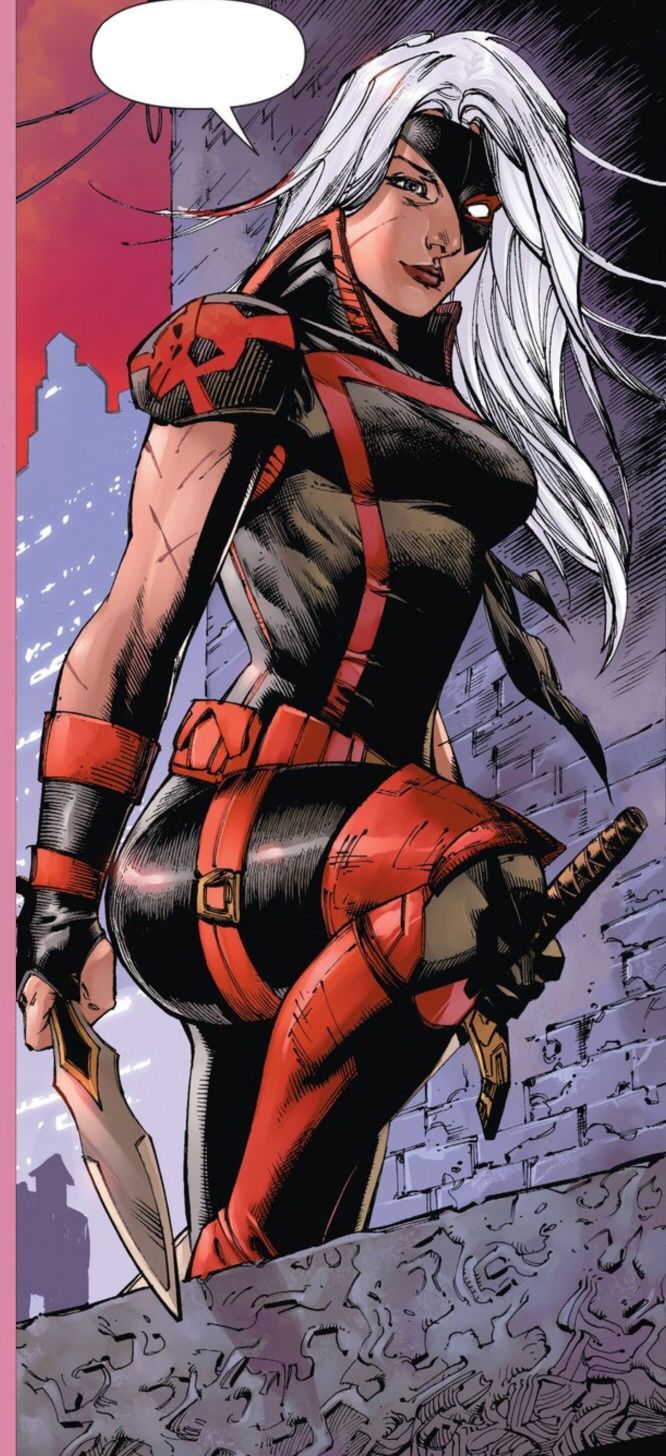
Slade Wilson (Deathstroke) meets a Cambodian woman named Lillian Wilson (born: Lillian Worth) on a search-and-rescue mission a few years after his divorce from Adeline Kane. His mission is to make sure that she escapes war-torn Cambodia safely. After an intermittent love affair with Wilson, Worth gives birth to a daughter whom she names Rose. Believing it to be in the child's best interest, Worth keeps Rose a secret from Wilson. Worth eventually settles down at a brothel in New York City, and, during a time when Deathstroke is injured and a fugitive from the law, Worth takes him in and nurses his wounds. Wintergreen (Deathstroke's butler) discovers 14-year-old Rose and suspects that she is Deathstroke's daughter.
When Ravager (Wade DeFarge – Deathstroke's half-brother) kills Deathstroke's friends and family, Ravager discovers Rose, captures her, and tells her that Deathstroke is her father. Wintergreen and Worth launch a rescue attempt, but Worth is presumed dead after she drives a Jeep off a cliff while trying to run over DeFarge. Wintergreen successfully rescues Rose and escapes.
Rose tries to reach out to her father, but he turns her away. He fears for her safety because he believes himself to be responsible for the deaths of two of his sons. Deathstroke leaves her in the care of the Teen Titans superhero team. During a training exercise, Rose is injured and taken to the hospital, and her precognitive powers emerge for the first time when she has a lengthy vision of Deathstroke's future. She awakens before she can test her powers further. She leaves the Titans shortly after and does not see them again until the Technis Imperative conflict, where she allies herself with the Titans to save fellow Titan Cyborg. During this incident, she vocally challenges the New God Big Barda, as the Titans and the Justice League had come to blows. Barda seems more amused than concerned over Rose and their potential fight is neutralized by other forces.
New RavagerEdit
The Madison family in Chicago adopt Rose, but DeFarge kills her new family. The Ravager claims to have been offered $100,000 for her death by an anonymous source, but neither of them know that Deathstroke hired DeFarge in an attempt to bring Rose closer to him.
Deathstroke anonymously alerts the Titans that Rose's life is in danger, and they fight to defend her. All of the fighters are rendered unconscious by an explosion of halothane gas, and Rose awakens in Deathstroke's lair. He apologizes to Rose for abandoning her and says that she is the only family he has left. Deathstroke suggests that she become his apprentice, offering DeFarge as her first kill. Rose accepts and takes the name “Ravager” for herself. Deathstroke secretly injects Rose with the same serum that gave him his abilities, and it causes her to suffer from psychosis.
Deathstroke doubts Rose's readiness to work with him and plans to disown her after she hesitates and is unable to kill Deathstroke's son Jericho (when he possesses Beast Boy's body). To prove her loyalty, she gouges out an eye to match his missing eye.

Batgirl vs Ravager. Cover to Batgirl #64 (2005). Art by Alé Garza.
After Rose suffers a defeat at the hands of Batgirl, Deathstroke places her under the tutelage of Nightwing after Slade is led to believe he has given up being a hero. Nightwing agrees to train Rose, while surreptitiously teaching her the values of heroism. Although Rose develops a crush on Nightwing as the training progresses, the attraction seemed entirely one-sided. In order to test Grayson's loyalty, Deathstroke replaces Rose's missing eye with one carved from Kryptonite and pits her and Nightwing against Superman. Rose attempts to kill Superman, but Nightwing uses Superman's concern for the safety of not only the civilian bystanders, but Rose herself as her final lesson on altruism. Nightwing agrees to stay away from Rose on the condition that Blüdhaven remained off-limits to the latest incarnation of The Society, of which Deathstroke is a charter member. Following the bombing of Blüdhaven on Deathstroke's orders in Infinite Crisis, Nightwing returns and informs Rose that the Kryptonite Deathstroke had implanted in her eye-socket is not just a danger to Kryptonians, but it is also carcinogenic and is indeed lethal to humans under extended periods of prolonged exposure. Enraged and heartbroken that her father would endanger her life so dismissively, and emboldened by Nightwing's tutelage, Rose breaks all ties with her father and runs away.
One year after the events depicted in the Infinite Crisis crossover, Rose once again joins the Teen Titans. She wears the same costume and wields two katana-style swords. With Deathstroke and his serum's influence gone, Rose appears more balanced than previously depicted. Robin admits Rose to the team as a favor to the team founder and ex-leader, her former mentor Nightwing.
Rose forms a friendship with Kid Devil, using his flame breath to light her cigarettes. When Kid Devil is injured during a mission, Rose defends him, and on multiple occasions threatens those she deemed a threat to him. She later admits to Kid Devil that she is afraid of being kicked out, should the old members return to the team.
Over the lost year, the Teen Titans came to the conclusion that they needed more members. After discovering that Raven believes there was a traitor on the team during the previous year, the team agrees to begin with her. The team travels the world in search of Raven apparently on the run from the traitor. They also meet several other former Titans, such as Red Star, Zatara, and Bombshell. During a meeting with Bombshell, Rose is accused of being the latest traitor, working for Deathstroke instead. She denies the accusation, supported by not only Kid Devil, but also Wonder Girl, who believes Rose would never go back to her father. Robin and Cyborg agree that Ravager would return to the Tower. Furious, Rose prepares to quit the team altogether until the team's caretakers Wendy and Marvin reveal to her that the traitor had stolen one particular object: the computer disk containing Jericho's essence.
Realizing why Raven is truly on the run, Ravager quickly returns to the Titans' aid, just as the traitor is revealed to be Bombshell. Ravager manages to save Raven, just as the empathic Titan uses the same spell which resurrected her to resurrect Rose's dead and previously insane half-brother Jericho. Upon the resurrection of her elder brother, Joseph and Rose begin fraternizing, unaware that Bombshell's betrayal was orchestrated by Deathstroke, and that their teammates have been subdued by his associates.
Later, Rose and Joseph fly to New York to have lunch with Nightwing, after which they go to the original Titans Island and discover that someone has built a demented version of the original tower there. Upon entering, they find that their father has kidnapped their teammates, all in order to gain control of them again. Rose and Joey then rescue Robin from Slade and Batgirl, during which Rose finally has her rematch with Cassandra Cain. Rose and Joey both attempt to stop their father, but they are defeated and left at his mercy until Nightwing, Donna Troy, Raven, Cyborg, Duela Dent, Beast Boy, and Bart Allen arrive.
Following the death of her former-teammate Bart Allen, Rose attends his funeral in Countdown #43 along with the rest of the Teen Titans.
In Teen Titans #50, Rose is present for Bart's wake, although she slips off after a while, bored with the somber, reminiscent atmosphere, and invites Kid Devil to join her in skinny-dipping in the Titans' swimming pool.
In Teen Titans vol. 3 #51, the Titans Tomorrow—a possible future version of the current Titans team—arrive in the present to aid the Teen Titans against Starro-controlled villains. Ravager's future-self is absent from the group and it is revealed that she betrays the team (primarily Bart Allen and Kid Devil) at some point. Kid Devil, his adult version Red Devil, and Rose are then sent to battle against Rampage & Livewire. Red Devil tries to convince Eddie to let Rose die during the fight, so that she does not manage to betray them in the future. Initially, it appears that Eddie intends to do so, before betraying his older self in order to aid Rose. Later, the trio return to the Titans Lair (home of the original Teen Titans), where they meet with Blue Beetle. There, Red Devil attacks Blue Beetle, claiming that he too cannot be trusted.
Eddie, Rose, and Jaime find themselves surrounded by an army of Titans led by Lex Luthor before they all battle against an invading army of Starros. Thanks in large part to Blue Beetle's powers and Robin and Wonder Girl managing to supposedly alter Robin's future (and thus alter the future of the Titans as a whole), the army of Titans is apparently defeated.
In Teen Titans #57, Rose is attacked by Persuader, Copperhead, and Dreadbolt of the Terror Titans, who had managed to infiltrate Titans Tower. During the battle, they goad Rose about the fate of Kid Devil, whom they had earlier captured. Despite overwhelming numbers, they are unable to take down Rose. Rose ruptures a gas line with her energy swords, blowing up a section of the tower. Rose is revealed to have survived the explosion by crossing the swords, creating a forcefield. She then follows the Terror Titans back to their base, saving Wonder Girl from Disruptor and Persuader. She then battles Clock King, her own precognitive powers matching him. Clock King offers Rose a place on his team, but she refuses. Clock King then ejects the Titans from his base. Back at the tower, Rose overhears Robin and Wonder Girl talking about her almost killing Persuader during battle, and deciding there will be "repercussions". Rose decides to leave the Titans, using one of Clock King's teleportation devices to do it.
In Terror Titans #1, Ravager is seen talking with Clock King, negotiating her role within his group. She agrees to take part in one of The Dark Side Club's arena battles, fighting against Fever. Rose defeats Fever, but when given the order to finish her, refuses, prompting Clock King to have Fever shot in the head. Although appalled by Fever's death, Rose stays, hoping to find out what Clock King's plan is. Continuing to fight in the tournament, Rose faces off against Static, and is almost killed.[1] Rose eventually discover that Clock King intends to use the mind-controlled teen heroes as his own "Martyr Militia" to destroy Los Angeles, entirely for his own amusement. Attempting to get help, Rose is attacked by the Terror Titans, who overwhelm her.[2] Help comes in the form of Miss Martian, who had been posing as one of the brainwashed teens, and had managed to use her telepathy to free them. Ravager follows the retreating villains back to their base, where she confronts Clock King. Despite their equal precognitive abilities, Ravager is able to defeat him, although she was unable to prevent his escape.[3]
Ravager returns during the Teen Titans/Titans/Vigilante crossover "Deathtrap", seeking to save Jericho, who had been targeted by Vigilante. However, the unbalanced Jericho refuses her offer of help, continuing in his plot to kill the Titans, forcing Rose to team up with the heroes to stop him.[4] It is also apparent that she has become addicted to the adrenaline given to her by the Clock King.
Following the "Deathtrap" storyline, Rose briefly tries her hand at being a part of the Titans, but finds that she does not belong with them. After an altercation with Bombshell, staged to ensure her loyalty to the team, Rose leaves to find her own way in life.[5] From Teen Titans #72 onwards, Ravager is featured in a 10-page, 9 part co-feature, Ravager: Fresh Hell, written by Sean McKeever and drawn by Yildiray Cinar.
In the Teen Titans tie-in to the Blackest Night crossover, Rose tracks Deathstroke down to his old mentor Wintergreen's house and attacks him. During the fight, the two are attacked by their deceased relatives Grant, Wade and Adeline, who, along with Wintergreen, have all been reanimated as Black Lanterns. When Grant attacks Deathstroke, intending to burn him in a fireplace, Rose reluctantly intervenes, saving her hated father. She then attempts to incinerate Wade, but is surprised when Jericho jumps out of his body.[6] Jericho, whose eyes had grown back since Vigilante's attack, uses his powers to make the Black Lanterns destroy themselves. After the battle, Rose refuses to reconcile with Deathstroke, despite acknowledging her daughterly love for him. She also realises that her mother may still be alive, as she was not among the attacking Black Lanterns.[7]
Following an adventure in another dimension, Static, Miss Martian, Bombshell, and Aquagirl leave the Titans, and Rose is invited to rejoin the team in order to help build it back up. While staying in the Tower, Rose hacks into the team computer and begins searching for information on her mother.[8] During her time with the group, Rose begins flirting with Superboy, and befriends Damian Wayne, the new Robin. She remains with the team up until the final battle with Superboy-Prime and the Legion of Doom, where she teams with Speedy to take down Persuader, one of her former teammates on the Terror Titans. She and Damian also help turn the tide of the battle by using a piece of Kryptonite to destroy several evil clones of Superboy.[9]
The New 52Edit
Following the events of "Flashpoint", the DC Universe was relaunched. In the New 52, Rose now has both eyes intact and does not go by the name Ravager, though she still appears to have her martial arts training and trademark swords. She is a teenaged mercenary hired by the shadowy organization N.O.W.H.E.R.E. to act as a handler for Superboy after he destroyed the N.O.W.H.E.R.E. lab used to create him in self-defense. Rose has a rivalry with Caitlin Fairchild, a young N.O.W.H.E.R.E. researcher who cares for Superboy.[10] Her origin is altered so that she is now the daughter of Slade Wilson and his wife Adeline Kane, removing her Asian heritage in the process.
After last seen by the side of her father Deathstroke, following the events that happened in The Ravagers, she reappears in a possible future 20 years distant. In this timeline she is along her husband Garfield Logan, now labeled as Beast Man, living together in the Justice League Watchtower as Beast Man is the only Justice Leaguer alive. The two also have a daughter named Red who is being mentored by them along other superpowered teenagers in order for them to become a team. After an encounter with three members of the Teen Titans from the present Red Robin, Wonder Girl and Superboy, Rose and Gar put in action a plan to swap Superboy (Kon-El) with the man of whom he is a clone (Jon Lane Kent, son of Superman and Lois Lane), who is responsible for the tragedy that happened in that future, in order to prevent those events from happening again. The plan is a success as Raven's soul-self departs with the Titans from the present and the unconscious Jon Lane, not Conner. Once alone, Rose asks Gar if they really did the right thing, which Gar responds: "I damn well hope so Rose. I damn well hope so".[11]
DC RebirthEdit
Learn more
This article needs to be updated.
Rose later reappears after the DC Rebirth relaunch, with her original Cambodian origin and mixed-race heritage now restored.[12] She is seen working as a strip club bouncer who moonlights as a teenage mercenary, and reunites with her father after someone puts a hit on her. Her past in the New 52 continuity also appears to be retconned, as she makes no mention of N.O.W.H.E.R.E., and claims to have been trained by Nightwing, much to Slade's annoyance
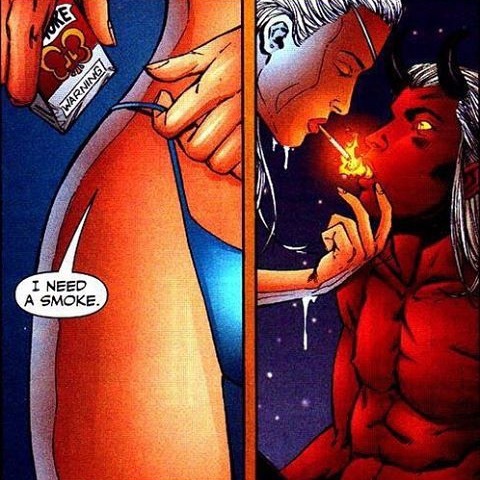
4 notes
·
View notes
Text

#fellow travelers#matt bomer#jonathan bailey#back rubbing#own gifs#get a room#Fellow Travelers 2023#fellow travelers psychosis
103 notes
·
View notes
Text
Dimitri Alexandre Blaiddyd: Victim, Killer, King
Starting this analysis off is the house leader of the Blue Lions, Dimitri Alexandre Blaiddyd. Spoiler warning for Fire Emblem: Three Houses. Trigger warning for discussions of mental illnesses and violence.
So, Dimitri was born as the only son and heir of King Lambert Blaiddyd of the Holy Kingdom of Faerghus. From a young age, Dimitri was trained to be a warrior, with physical and martial training taking precedence over anything else. Part of this is because he was the prince of a kingdom, and part of it is because of the culture of Faerghus. As a kingdom, Faerghus prizes martial strength, knighthood, and martyrdom. It prizes the idea of dying bravely in battle, and instills that idea in most of its children. However, Dimitri was a naturally kind person, and was not particularly suited to the kingdom he was meant to lead, at least in personality.
Despite being an only child, Dimitri actually possessed a stepsister, Edelgard von Hresvelg, the heiress to the Adrestian Empire. For a year when they were children, they became good friends, leading him to gift her a dagger when she was forced to return to the Empire. This relationship would come to define more of Dimitri’s life than he would have believed.
When Dimitri was 13, he, his family, and their guards went on a diplomatic trip to the peninsula of Duscur, allies of Faerghus. However, while traveling in Duscur, they were attacked. Dimitri’s father and one of his close friends died, and his stepmother vanished, presumed dead. Dimitri escaped with his life from the incident that would become known as the Tragedy of Duscur. At this incident, Dimitri saw, for the first time, the figure known as the Flame Emperor.
In response to this tragedy, Faerghus decimated Duscur, assuming them to be responsible, despite Dimitri’s pleas and claims that they weren’t. Ultimately, Dimitri was able to save Dedue, a boy from Duscur, from being killed in the misguided slaughter. Dedue proceeded to become Dimitri’s retainer, and one of his closest friends.
However, the Tragedy marked Dimitri in ways he hadn’t realized. Dimitri had psychosis, a mental disorder that showed itself with several symptoms, including entering a psychotic state when he was exposed to triggers from his trauma, and delusions that led him to believe that he was haunted by his fallen loved ones, and that taking revenge for them was the only way they would be able to rest. This was mixed with a trait of Dimitri’s that Dedue noted within the game: Dimitri was too kind to be a king. He cared so deeply about people, even the dead, that he was driven to rage trying to help them.
During the next 4 years, Dimitri grew up, guided by his father’s old friend Rodrigue Fraraldrius, and grew more and more disgusted by war. In his first battle, Dimitri found a man he killed with a locket containing a portrait of someone. He had a revelation that everyone who fought in wars were people with lives, and over the years, grew to despise war, and view it as the last resort of anything.
Ultimately, Dimitri entered the Officer’s Academy at Garreg Mach Monastery as leader of the Blue Lion house, in order to seek out his family’s killers and achieve revenge. At this point, he reunited with his stepsister Edelgard, though she failed to remember their time together at this point. During an exercise outside the monastery, he, Edelgard, and the third house leader Claude, were attacked by bandits, and sought help from a band of mercenaries, including Byleth Eisner.
This is the point when we are introduced to Dimitri, and he starts off by appearing to be a polite, trusting individual, and one who cares deeply about his fellow students. As the game goes on, we see more of Dimitri’s thoughts and views. When we are confronted with the injustices of the Crest system, Dimitri is revealed to believe that the world should function on merit, rather than birth. When Byleth’s father dies, he empathizes, and offers understanding.
When we are sent to Remire Village, that is the first time we see Dimitri’s psychosis manifest itself in-game. Triggered by the carnage, Dimitri enters a murderous state, where he orders his fellow students to “kill them all.” After the mission, he demonstrates a level of understanding, noting that that sometimes happened to him. It is also at this point that Dimitri admits that he seeks revenge for the Tragedy.
After the death of Jeralt, Dimitri and Byleth overhear the Flame Emperor speaking with Kronya and Solon. Hearing them move, the Flame Emperor threw a dagger at them, despite missing. After they leave, Dimitri takes the dagger, and is shocked to recognize it.
When the Blue Lions descend into the Holy Tomb with Byleth and Rhea, the group is confronted by the Flame Emperor and Imperial soldiers. In the ensuing battle, the Flame Emperor’s mask is knocked off, revealing it to be Edelgard. At this point, Dimitri demands whether it is a “twisted joke”, and his psychosis manifests again, leading him to fly into a rage, tearing through the Imperial soldiers to try and kill Edelgard, only for her to escape.
After this, the battle of Garreg Mach happens, and Byleth, Dimitri’s friend and mentor, disappears for five years. In this time, Dimitri’s fortunes take a turn for the worse. The Faerghus royal advisor Cornelia, secretly an agent of Those Who Slither in the Dark, kills Dimitri’s uncle and frames Dimitri for it, sentencing him to death. However, Dedue sacrifices himself to save Dimitri, and Dimitri disappears from the world for the five years.
During this time, Dimitri wanders Fodlan, hunting and killing Imperial soldiers wherever he finds them. With his only companions being the voices of the dead, Dimitri sinks deeper and deeper into his guilt-fueled rage, until Byleth finally reappears before him. While initially believing Byleth to be another apparition haunting him, Dimitri quickly realizes that Byleth is in fact alive, and soon after, the two are found by Gilbert and the Blue Lions. At this point, Dimitri is solely focused on killing Edelgard, and tears through whatever opposition he has to deal with, including an Imperial general. While still lost in his rage, Dimitri reunites with Rodrigue, but remains resolute in his insistence on killing Edelgard, no matter the cost.
It is at this point that an event occurs that begins Dimitri’s path away from revenge. In a battle to cross a bridge into Imperial territory, Dimitri is reunited with Dedue, who is revealed to have been saved by men from Duscur, and had spent these past 5 years hiding and recovering. At this point, Dimitri orders Dedue to live, and to never sacrifice himself again.
Following this, comes the second event. After the Battle at Gronder, the sister of the Imperial general Dimitri had killed attempts to assassinate Dimitri. However, Rodrigue throws himself into the blade’s path, saving Dimitri, and allowing Byleth time to kill the assassin. Full of grief, Dimitri mourns Rodrigue, and claims that Rodrigue should not have had to die for Dimitri’s sins. In his last words, Rodrigue implores Dimitri to live for his ideals, rather than for the dead. This grief is what jars Dimitri away from leading the other Blue Lions down his path.
Following this, Dimitri attempts to depart in the night, in order to try and kill Edelgard, but is confronted by Byleth. In the following conversation, Byleth helps Dimitri finally begin letting go of his guilt for surviving the Tragedy, and his need for revenge in order to quiet the voices in his head. This final push is the third event that changes Dimitri’s path.
Afterwards, Dimitri apologizes to the Blue Lions for endangering them, and proceeds to turn towards Fhirdiad, capital of Faerghus, in order to liberate his kingdom from the Empire. However, Dimitri is never without his psychosis, and there are times where he begins to enter a rage when triggered. Despite this, his friends help him stay grounded, and he makes earnest strides towards atonement.
After saving Claude from the Empire, Claude dissolves the Leicester Alliance, and gives the lands to Faerghus, with Dimitri as the king of all of it, despite believing that he is a monster with bloodied hands.
Before the final battle against Edelgard, Dimitri and Byleth meet with her, in an attempt to sway her from her path. Ultimately, Edelgard refuses to change her course, and Dimitri, filled with revulsion over the war she started, refuses to allow her to have her way. Before parting, he returns her dagger to her, causing her to remember their friendship as children.
After the battle to take the Imperial capital of Enbarr, Dimitri attempts to offer Edelgard one last chance, but she forces him to kill her by attacking him. He then is crowned king of all of Fodlan.
Ultimately, Dimitri’s story is of a boy falling into darkness, and of eventually rising out of it as a man. He is witness to atrocities that scar him for life. In his five year rampage born of grief, rage, and psychosis, he kills and murders numerous people. When he begins recovering, he becomes a deeply considerate man, offering his enemies chances to surrender, and mourns his stepsister’s death at the end. The lesson Dimitri is forced to learn is a difficult one: You can’t save everyone.
At heart, Dimitri is a good man, albeit one who commits terrible crimes. His heart was too big for his time, and attempting to save as many people as he could, even the dead, led him down a path of revenge. However, he brings a lasting peace to Fodlan, helps restore Duscur, and acts as a kind king for the rest of his life. Dimitri’s story is one that tells that no matter how dark a place you may be in, you can always reach for the dawn and rise up.
#fire emblem#fe3h#fe3h spoilers#fire emblem dimitri#dimitri fire emblem#fire emblem spoilers#fire emblem azure moon#fe azure moon spoilers
9 notes
·
View notes
Note
Hi! I just wanted to ask if your main character had a theme song or piece of music, what would it be and why? 💛
Hi, @conkers-theficwriter! Thanks for the Ask!
This is such a lovely question! Especially since I adore making character playlists for my WIP! For the sake of this answer, I'll only consider the main POV characters (who are the protagonists of their parts of the story, since this novel has a Multiple POV outlook) from The Last Wrath!
RAELEN ASHIREN (theme song) - Dance with Fire by Karliene and Sing of Manetheren by Wheel of Time (cover by Gustavo Steiner)
ELLINOR DALLANTES (theme song) - Noble Blood by Tomme Proffit ft Fleurie and Queen of The Kings by Alessandra
JULYAN ASHIREN (theme song) - Lightbringer by 2WEI ft Ali Christenhusz and Just a Man by Epic The Musical
DARIAN CAELESTIS (theme song) - Speechless (Aladdin Live Action Soundtrack) male cover by Caleb Hyles
JAMIE TELLIAN (theme song) - Protector by City Wolf and Open Arms by Epic the Musical
LUCIYA ANYNTH (theme song) - Over the Hills and Far Away cover by Hurdy Gurdy
And that's it for the main characters!
But since I love sharing my character playlist for this WIP, here are the (updated) songs for the supporting cast as well!
INNARA RENFELLI (theme song) - Touch the Sky - Merida (dark cover by Lydia the Bard) and Reflection - Mulan (cover by Anna Pantsu)
ORYON ZYNDOR (theme song) - Drown with Me by Falconshield
ANSELL KALLIK (theme song) - Higher Ground by Rasmussen
LORD NETHEN FAHRIS (theme song) - Hell to Your Doorstep by The Count of Monte Cristo Musical and All the Magic by Karliene
NYX FAESTORM (theme song) - Song of the Seven by Joey Batey (The Witcher Soundtrack)
KADEN RIHDEL (theme song) - Thus Always to Tyrants by The Oh Hellos and The Bard Song by The Blind Guardian
SYBIL RIHDEL (theme song) - Savage Daughter by Sarah Hester
SEIRA NIVAINE (theme song) - Broken Crown by Mumford and Sons and Just Around the Riverbend by Brittany J Smith
AZRA MOORSWORTH (theme song) - Dragon by Built By Titan
HELIOS MAEVEL (theme song) - Goodbye by Bo Burnham and Amen by Frankenstein the Musical
TANWIN LYRANDETH (theme song) - Heart of The Night by Divide Music and Perfect by Miracle of Sound
EMRYC THORNE (theme song) - Everybody Loves Me by One Republic
VALLERIUS ZYNDROSAR (theme song) - The Horror and The Wild by The Amazing Devil
MORWAN DESTRIN (theme song) - Kings of the Sea by Karliene and Calling by The Amazing Devil
NADDINE AHMIRAH (theme song) - Grace O'Malley by Kinnia and Wild Uncharted Waters cover by Anna Pantsu
BRYN SEPERI (theme song) - Psychosis by Michel Dae
CASSANDER FYNN (theme song) - The Halfman's Song by Miracle of Sound
PEREGRINE DUSKEBLOM (theme song) - The World We Made by Ruelle and Alone by Cami-Cat
ISOLDE KIERAH (theme song) - Loyal, Brave, and True by Christina Aguilera
ARAMMIS DOHRFAREN (theme song) - Dance to The Day by Prince of Egypt The Musical
YUNA THYREN (theme song) - Mary Read by Karliene
FABIAN ANYNTH (theme song) - Dynasty by MIIA and Hero by Jeff Williams ft Caleb Hyles
ZEPHYR TELLIAN (theme song) - Monster by Frozen The Musical and Which Witch By Florence+The Machine
MYRAH FARON (theme song) - Dear Fellow Traveler by Sea Wolf and On My Father's Wings cover by Brittany J Smith
GENERAL TRYSTAN GRAYSPEAR (theme song) - Woe to The People of Order by Cami-Cat and Ruthlessness by Epic the Musical
LUKAN VELTERIN (theme song) - Legends the Score and Coast of High Barbary by Topgallant Jack
ELAIN (theme song) - Teen Idle by Marina and The Diamonds and Heart Of Stone cover by Matt Bloyd
CIRIEN SEPERI (theme song) - Blow High, Blow Low by Karliene (Only imagine a gender-bent version of this song. In the original song, the character is female, but this character here is male. It's just that the lyrics match too well with his story otherwise!)
2 notes
·
View notes
Quote
A man who became manic after being infected with coronavirus got so delirious he confessed to his wife that he used to have sex with men, doctors have revealed. The unidentified 41-year-old, who was treated at St Thomas’ Hospital in London, also became ‘highly aroused’ and uninhibited, questioning and inappropriately touching nurses tasked with treating him. He also became obsessed with ‘grandiose ideas’ and tried to smear water on fellow patients as if he were baptising them, medics said in a bizarre case report. The man was sick with a cough and fever for 10 days before he ended up in hospital and tested positive for Covid-19, which doctors believe triggered unusual symptoms. He eventually had to be sectioned under the Mental Health Act because he became so out of control. Describing the experience in his own words after recovering as ‘fascinating’, the man said he thought he was ‘trying to help the doctors as much as I could’. He added: ‘I began to think that I was part of a TV show, in which I was sent back from the future to save the NHS, and I was curious to see how this would end.’ The doctors said it was possible his episode was the first sign of a condition such as bipolar disorder — but did not diagnose him with that and instead put it down to the coronavirus despite admitting they can’t prove it for certain. One mental health expert told MailOnline it is well documented that immune system reactions can affect the brain and trigger mania such as what the man suffered, calling his episode ‘bizarre but not extreme’. There is growing evidence that Covid-19 can affect the brain and nervous system in various ways, the most common of which is losing the sense of smell and taste. There is growing evidence that the coronavirus, and the body’s immune response to it, can affect the brain and trigger mental health symptoms (stock image of a brain scan) Writing in the BMJ Case Reports medical journal, Dr Jamie Mawhinney and colleagues said: ‘This is, to the best of our knowledge, the first report of an acute episode of mania or psychosis as a result of SARS-CoV-2 infection.’ The man went to A&E in the early hours of the morning at the London hospital where Prime Minister Boris Johnson was treated for Covid-19. He had woken in the middle of the night feeling like his ‘brain was racing’ and telling his wife he thought he would die, doctors reported. He had told his wife about sex he had had with men, ‘mostly’ before they were married, which she had never heard him talk about before. The man also confessed to other ‘uncharacteristic’ sexual behaviours and became uninhibited and acted inappropriately while in the hospital. In the report the doctors said: ‘He was loud and highly aroused with sexual disinhibition and overfamiliar behaviour, inappropriately questioning and touching members of staff. ‘His speech was pressured, and his mood subjectively and objectively elevated. ‘His thoughts were grandiose with persecutory elements, and he had persistent strong religious ideas, manifestations of which included attempts to anoint fellow patients with water. ‘He also obsessively wrote down every personal interaction and bodily sensation. He said he found this experience “liberating”.’ The man’s behaviour became so uncontrollable he had to be sedated and was transferred to intensive care and supported with ventilation. Investigations confirmed that he was positive for SARS-CoV-2 – the virus which causes Covid-19 – but the virus was not found in his spinal fluid, which would have proved it was in his central nervous system and could have travelled to the brain. After 24 hours on ventilation, he was moved to a ward where his coronavirus symptoms lessened, but mental state remained abnormal. COVID-19 CAUSES DELIRIUM AND STROKE IN ‘HIGHER THAN EXPECTED’ PATIENTS Infection with the coronavirus can cause delirium, stroke and nerve damage in ‘a higher than expected number of patients’, a study has found. Experts from University College London have reported a ‘concerning increase’ amid the pandemic of a rare brain inflammation known to be triggered by viral infections. Typically seen in children, acute disseminated encephalomyelitis — or ‘ADEM’, for short — affects the both the brain and spinal cord. The condition — which can follow on from minor infections such as colds — sees immune cells activated to attack the fatty protective coating that covers nerves. The researchers have warned that clinicians need to be aware of the risk of neurological effects to help early diagnoses and improve patient outcomes. ‘We identified a higher than expected number of people with neurological conditions such as brain inflammation,’ said paper author and consultant neurologist Michael Zandi of the University College London. The appearance of these conditions, he added, ‘did not always correlate with the severity of respiratory symptoms.’ ‘We should be vigilant and look out for these complications in people who have had COVID-19.’ ‘Whether we will see an epidemic on a large scale of brain damage linked to the pandemic — perhaps similar to the encephalitis lethargica outbreak in the 1920s and 1930s after the 1918 influenza pandemic — remains to be seen.’ The researchers also found that other neurobiological complications — including delirium, stroke and nerve damage — appear to be associated with coronavirus. In their study, Dr Zandi and colleagues studied 43 patients — aged from 16-85 — with both neurological symptoms and either confirmed or suspected COVID-19 that were treated at the National Hospital for Neurology and Neurosurgery in London. According to the researchers, many of the patients did not experience any of the respiratory symptoms often associated with the coronavirus. Among the cohort, the team identified 10 cases of temporary brain dysfunction with delirium, eight cases of strokes and eight cases with nerve damage. There were also 12 cases of brain inflammation — with nine of such patients being diagnosed with ADEM. Under normal circumstances, the London-based team said that they would only see around one adult patient with ADEM per month, on average — but that this figure has increased to at least one patient per week amid the pandemic. Further studies are needed to identify exactly why some COVID-19 patients are developing neurological complications, the researchers concluded. ‘By day eight, his behaviour had escalated further culminating in a security call and emergency sedation for the safety of himself, the ward staff and other patients,’ the report said. Psychiatric assessment found features consistent with acute mania – a state of extreme energy and arousal which can be euphoric but lead to violence – and he was detained under the Mental Health Act. Mania is often conceived as a mirror image to depression, with the two moods associated with bipolar disorder. The man was transferred to an psychiatric hospital and commenced on regular olanzapine – used to treat schizophrenia and certain types of bipolar disorder. Twelve days after being sectioned, the patient’s mania finally subsided and he was discharged. Reflecting on his experience, the man said: ‘I was taken to hospital on the 4th April with what I would describe as the worst headache of my life. At this time, I had been suffering with the symptoms of Covid-19 for over a week. ‘I was in hospital for a total of 20 days with psychosis and mania, which I experienced as fascinating. ‘This may seem strange from an outside perspective, but I was, in my mania, trying to help the doctors as much as I could, while at the same time trying to make sense of my condition. ‘For my family and friends it was frightening. Luckily, they had a lot of support from each other, and from the great team of doctors at St. Thomas hospital.’ On follow-up, doctors revealed the man was slowly being weaned off antipsychotics while his wife said he is now back to ‘his baseline level of function’. The doctors said they couldn’t rule out the first manic episode of bipolar disorder – which the patient’s sister had been diagnosed with previously. But it was clear the drastic changes in behaviours started at the same time as his tell-tale coronavirus symptoms. Professor Anthony S. David, director at the University College London Institute of Mental Health and author of ‘Into the Abyss: a neuropsychiatrists notes on troubled minds’, told MailOnline the man’s condition was ‘bizarre but actually not so extreme’ He said: ‘Psychiatrists talk about hypomania – a mild form of mania with elevated mood and feeling “high” – but mania proper includes delusions, typically grandiose, e.g. that one is god or has special powers, talking very fast, spending money and being disinhibited sexually. So this is what mania looks like. ‘Mania can be triggered by stress, lack of sleep, physical illness, drugs etc – but you have to have a predisposition. This man’s family history is probably relevant.’ He said that doctors are seeing growing numbers of neurological symptoms of Covid-19, but that they usually seemed to be caused by the immune system, rather than the virus itself getting into the brain – although this was possible, too. Professor David added: ‘Fever on its own disrupts thinking and could be enough to tip someone over into mania, if they were predisposed. A change in sleep-wake cycle is another cause. ‘The immune system can affect the brain – that is why we all feel generally yuck when we have an infection, even if the infection is in another part of the body. Inflammatory chemicals and cells circulate and some can affect the brain. ‘The more specific effect – which is rare but well recognised following other viruses – is that an immune response is triggered and the antibodies end up attacking the person’s brain in an effort to kill the virus – sort of “collateral damage”. ‘Depending where the damage is concentrated, this can cause delusions as well as affecting consciousness, memory etcetera.’ He said some medications being used to treat coronavirus, such as steroids, are known to cause mania and psychosis. The man is not known to have been receiving treatment before his episode began, however. Doctors pointed out Covid-19 manifests in a number of ways affecting multiple systems – including the central nervous system (CNS). The coronavirus enters human cells by latching onto ACE-2 receptors on the surface. Although the lungs are the key site for expressing ACE-2 in the body, it is also found in endothelial cells in the brain. This may provide a route into the CNS. Previous reports have linked SARS-CoV-2 in the development of viral encephalitis – inflammation of the brain causing delirium, changes in personality and confusion. Yesterday University College London revealed study findings that the coronavirus can cause delirium, stroke and nerve damage in ‘a higher than expected number of patients’. Experts from University College London have reported a ‘concerning increase’ amid the pandemic of a rare brain inflammation known to be triggered by viral infections. Of the patients they studied with altered brain function, none had detectable levels of the coronavirus in the brain or spinal fluid – much like the 41-year-old case report. This, they explained, suggests that the virus did not directly cause the neurological symptoms and that some complications of COVID-19 ‘might come from [one’s] immune response, rather than the virus itself.’ They said it ‘remains to be seen’ if the pandemic causes an epidemic of brain damage. The post Delirious coronavirus-infected man confesses to his wife that he used to have sex with men appeared first on Shri Times.
http://sansaartimes.blogspot.com/2020/07/delirious-coronavirus-infected-man.html
1 note
·
View note
Photo
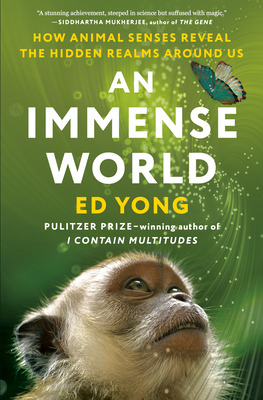


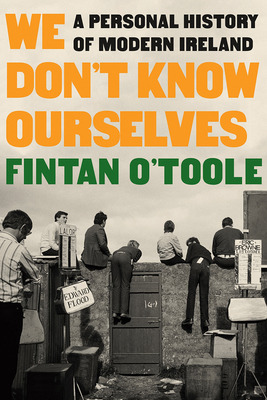

New York Times Best Books of 2022 : Nonfiction
An Immense World by Ed Yong
The Earth teems with sights and textures, sounds and vibrations, smells and tastes, electric and magnetic fields. But every animal is enclosed within its own unique sensory bubble, perceiving but a tiny sliver of an immense world. This book welcomes us into a previously unfathomable dimension - the world as it is truly perceived by other animals.
We encounter beetles that are drawn to fires, turtles that can track the Earth's magnetic fields, fish that fill rivers with electrical messages, and humans that wield sonar like bats. We discover that a crocodile's scaly face is as sensitive as a lover's fingertips, that the eyes of a giant squid evolved to see sparkling whales, that plants thrum with the inaudible songs of courting bugs, and that even simple scallops have complex vision. We learn what bees see in flowers, what songbirds hear in their tunes, and what dogs smell on the street. We listen to stories of pivotal discoveries in the field, while looking ahead at the many mysteries which lie unsolved.
In An Immense World, author and acclaimed science journalist Ed Yong coaxes us beyond the confines of our own senses, allowing us to perceive the skeins of scent, waves of electromagnetism, and pulses of pressure that surround us. Because in order to understand our world we don't need to travel to other places; we need to see through other eyes.
Stay True by Hua Hsu
In the eyes of eighteen-year-old Hua Hsu, the problem with Ken - with his passion for Dave Matthews, Abercrombie & Fitch, and his fraternity - is that he is exactly like everyone else. Ken, whose Japanese American family has been in the United States for generations, is mainstream; for Hua, the son of Taiwanese immigrants, who makes 'zines and haunts Bay Area record shops, Ken represents all that he defines himself in opposition to. The only thing Hua and Ken have in common is that, however they engage with it, American culture doesn't seem to have a place for either of them.
But despite his first impressions, Hua and Ken become friends, a friendship built on late-night conversations over cigarettes, long drives along the California coast, and the textbook successes and humiliations of everyday college life. And then violently, senselessly, Ken is gone, killed in a carjacking, not even three years after the day they first meet.
Determined to hold on to all that was left of one of his closest friends - his memories - Hua turned to writing. Stay True is the book he's been working on ever since. A coming-of-age story that details both the ordinary and extraordinary, Stay True is a bracing memoir about growing up, and about moving through the world in search of meaning and belonging.
Strangers to Ourselves by Rachel Aviv
In Strangers to Ourselves, a powerful and gripping debut, Rachel Aviv raises fundamental questions about how we understand ourselves in periods of crisis and distress. Drawing on deep, original reporting as well as unpublished journals and memoirs, Aviv writes about people who have come up against the limits of psychiatric explanations for who they are. She follows an Indian woman, celebrated as a saint, who lives in healing temples in Kerala; an incarcerated mother vying for her children’s forgiveness after recovering from psychosis; a man who devotes his life to seeking revenge upon his psychoanalysts; and an affluent young woman who, after a decade of defining herself through her diagnosis, decides to go off her meds because she doesn’t know who she is without them. Animated by a profound sense of empathy, Aviv’s exploration is refracted through her own account of living in a hospital ward at the age of six and meeting a fellow patient with whom her life runs parallel - until it no longer does.
Aviv asks how the stories we tell about mental disorders shape their course in our lives. Challenging the way we understand and talk about illness, her account is a testament to the porousness and resilience of the mind.
We Don’t Know Ourselves by Fintan O’Toole
A quarter-century after Frank McCourt’s extraordinary bestseller, Angela’s Ashes, Fintan O’Toole, one of the Anglophone world’s most consummate stylists, continues the narrative of modern Ireland into our own time. O’Toole was born in the year the revolution began. It was 1958, and the Irish government—in despair, because all the young people were leaving—opened the country to foreign investment. So began a decades-long, ongoing experiment with Irish national identity.
Weaving his own experiences into this account of Irish social, cultural, and economic change, O’Toole shows how Ireland, in just one lifetime, has gone from a Catholic “backwater” to an almost totally open society. A sympathetic-yet-exacting observer, O’Toole shrewdly weighs more than sixty years of globalization, delving into the violence of the Troubles and depicting, in biting detail, the astonishing collapse of the once-supreme Irish Catholic Church. The result is a stunning work of memoir and national history that reveals how the two modes are inextricable for all of us.
Under the Skin by Linda Villarosa
In 2018, Linda Villarosa's New York Times Magazine article on maternal and infant mortality among black mothers and babies in America caused an awakening. Hundreds of studies had previously established a link between racial discrimination and the health of Black Americans, with little progress toward solutions. But Villarosa's article exposing that a Black woman with a college education is as likely to die or nearly die in childbirth as a white woman with an eighth grade education made racial disparities in health care impossible to ignore.
Now, in Under the Skin, Linda Villarosa lays bare the forces in the American health-care system and in American society that cause Black people to "live sicker and die quicker" compared to their white counterparts. Today's medical texts and instruments still carry fallacious slavery-era assumptions that Black bodies are fundamentally different from white bodies. Study after study of medical settings show worse treatment and outcomes for Black patients. Black people live in dirtier, more polluted communities due to environmental racism and neglect from all levels of government. And, most powerfully, Villarosa describes the new understanding that coping with the daily scourge of racism ages Black people prematurely. Anchored by unforgettable human stories and offering incontrovertible proof, Under the Skin is dramatic, tragic, and necessary reading.
#nonfiction#nonfiction books#nonfiction reads#2022 books#best books#new york times#nyt#library books#book recs#book recommendations#reading recs#reading recommendations#TBR pile#tbr#to read#book blog#reading blog#booklr#book tumblr
1 note
·
View note
Text
Whizz Town Literary Review 2020
Wigan lies just a few miles down the road from St Helens, where I was born. Wiganers considered us the noisy neighbours while we joked that they were humourless country bumpkins. When I first looked down from Billinge Lump onto Wigan’s pit heads and smoking chimneys dotted among a conglomeration of cluttered streets, what I saw looked like the mirror image of my home town. We were both part of the same coalfield, even if Wiganers gravitated towards Manchester and we towards the Irish Sea.
Sometimes in the summer holidays, I travelled by train from my grandma’s house near Bolton to Wigan’s Wallgate station. Armed with my Ian Allan ABC books and a pencil, I took my place at the end of the platform there. For hours, along with a group of Wigan lads, I stared down the tracks looking for veils of black smoke, listening for the first rumble from the track. Then, all of a sudden, the ‘semi’, with its devouring wheels, was there in front of us, breathing fire and sweating steam, pistons hissing and rods thrusting as it pulled its scarlet livery in a straight line up to Euston.
With its grimy river and even grimier canal, Wigan was a hard-living town – a place full of industry, where men toiled in unpleasant jobs to keep their families fed and clothed. The clanking of cages in echoing shafts, the clatter of shuttles, metal on metal, hooters, cranks and levers and the whir of heddles were what I heard whenever Wigan came into view. Camelot, once the home of the White Knight, lay close by where the forests once stood.
In 1901, H G Wells, a staunch believer in the power of engines, wrote a short story called ‘The New Accelerator’, which was published in The Strand Magazine. A pharmacologist called Professor Gibberne synthesises a nervous stimulant that he hopes will help the tired and exhausted to cope with the stress of modern life. In the noble tradition of science, he decides to test the nostrum on himself first. Within seconds of taking a few drops, Gibberne and the narrator both experience a sensation of imminent combustion. As they travel through Folkestone at two miles a second, they are disgusted by the glacial catalepsy of their fellow promenaders: a bee’s wings seem to vibrate more slowly than the progress of a snail down a garden path and the wink of a man loses its quality of spontaneous gaiety. After an indeterminate period of time they feel like an express train slowing down into a station, and return to quotidian dreariness.
Gibberne informs the narrator that his ongoing research at University College London to develop an antidote called the Retarder will not delay the introduction of the New Accelerator into clinical practice as treatment for a disease referred to down the road in Harley Street as neurasthenia and in Wigan as bone idleness. With a sangfroid that would no longer be tolerated by the regulators in the service bureaucracies, he adds: ‘Like all potent preparations it will be liable to abuse. We have, however, discussed this aspect of the question very thoroughly, and we have decided that this is purely a matter of medical jurisprudence and altogether outside our province. We shall manufacture and sell the Accelerator, and, as for the consequences – we shall see.’
Wells anticipated the commercialisation of amphetamine by over twenty-five years. A few months after I read ‘The New Accelerator’, in what I refused to accept was an uncanny coincidence, I started my own research into speed at University College London. Amphetamine was now a class B drug and known to cause psychosis and dependence. Doctors had been advised to prescribe it only for the treatment of narcolepsy and the management of hyperactive children. Unlawful possession carried a penalty of up to five years in prison.
I gave dextroamphetamine to caged male Sprague Dawley rats and observed their movements. Within a few minutes of injection they started to make tight circles, shimmy backwards and occasionally somersault. I then injected amphetamine, in combination with other compounds known to block or enhance the release of serotonin and noradrenaline. My colleagues and I concluded that the chemical messenger dopamine was responsible for the stereotyped behaviour of the rats and that amphetamine derivatives should be reinvestigated as a treatment for Parkinson’s disease.
On the way to the laboratory in John’s Mews, I would sometimes stop to read the names of the Lancashire towns inscribed on the lodges at the gateway to Euston station. The name of Wigan prompted a faint glow in my mind, inextricably linked with the smell of mint and treacle. During the time I was carrying out my experiments with the lab rats, Wigan Casino had become the undisputed headquarters of Northern soul. The nightclub’s members, predominantly white, male and working class, wore baggy trousers, star knit polo shirts and Solatio boxtop loafers. Obscure up-tempo tracks with heavy syncopation, four-to-the-floor rhythm and plenty of horns became the signature dance sound. Some of the Wallgate trainspotters had become spanophiles, collectors of rare seven-inch vinyls, spending all their spare time rummaging through forgotten crates of demos, visiting out-of-the-way record shops and even travelling to Detroit in search of uncommon finds. The stars of the Casino were black singers that Berry Gordy at Tamla Records had overlooked, along with a handful of blue-eyed soul artists like Frankie Valli and Timi Yuro.
Wigan has long had a fascination with celerity. For Wigan’s soul boys, amphetamine was the ideal accelerator. It made the heart race and enhanced respiration, provided momentum and facilitated hours of nonstop dancing. Speed could subvert clock time and accelerate travel in the fourth dimension. The music never died, but each all-nighter came to symbolise a little death. Looking down from the Casino balcony, all one could see was a blur of frantic supercharged excitement. The intricate, balletic dervish spins, Soul Train turns, backdrops and Bruce Lee somersaults reminded me of amphetamine-driven rats.
In The Road to Wigan Pier, George Orwell called attention to the plight of the powerless masses during the Great Depression. He wrote that his journey to Wigan was akin to ‘venturing among savages’ in a foreign land. He described the town’s ‘belching chimneys’, a woman with a desolate expression poking a stick up a drainpipe, rats on the snow-topped slag heaps and the Roquefort cheese appearance of a miner’s nose. Those cheerful men I saw at Knowsley Road in St Helens when Wigan’s rugby league side came to play belonged to a mechanised workforce, constrained by rigid management systems in a squalid, impoverished, ugly town.
Orwell’s well-meaning call to arms encouraged hopelessness and surrender and failed to empower the place. For people in Wigan, there was no pleasure in taking money from the state. Even today, many would rather still be self-combusting down the pits, since it paid well and provided steady work. In last December’s election, the Labour majority in Wigan was reduced from 16,000 to 7,000. Jeremy Corbyn’s elite city socialism did not resonate in a town engaged in fighting a race to the bottom. Its MP, Lisa Nandy, is now competing to replace Corbyn as Labour Party leader.
Wells believed that the speeding up of land locomotion would revolutionise society, that the distinction between town and country would become obsolete and that a new urbanity would evolve. The New Accelerator was a product of the human desire to achieve instantaneous communication and connection. Breathless lightning breaks, a boy with twinkle toes in a T-shirt and black shorts, and a register of inviolable racy tunes are Wigan’s lasting benefaction. Analeptics and high-speed broadband might just prevent Whizz Town from dying.
0 notes